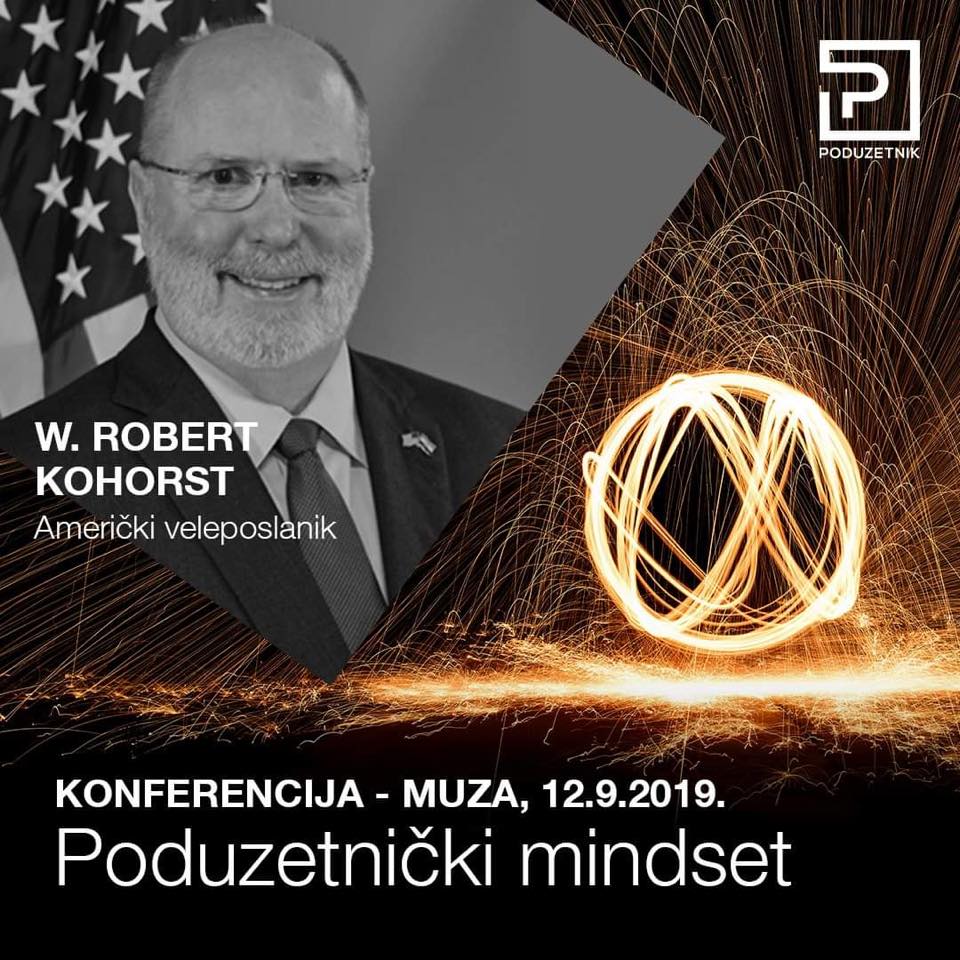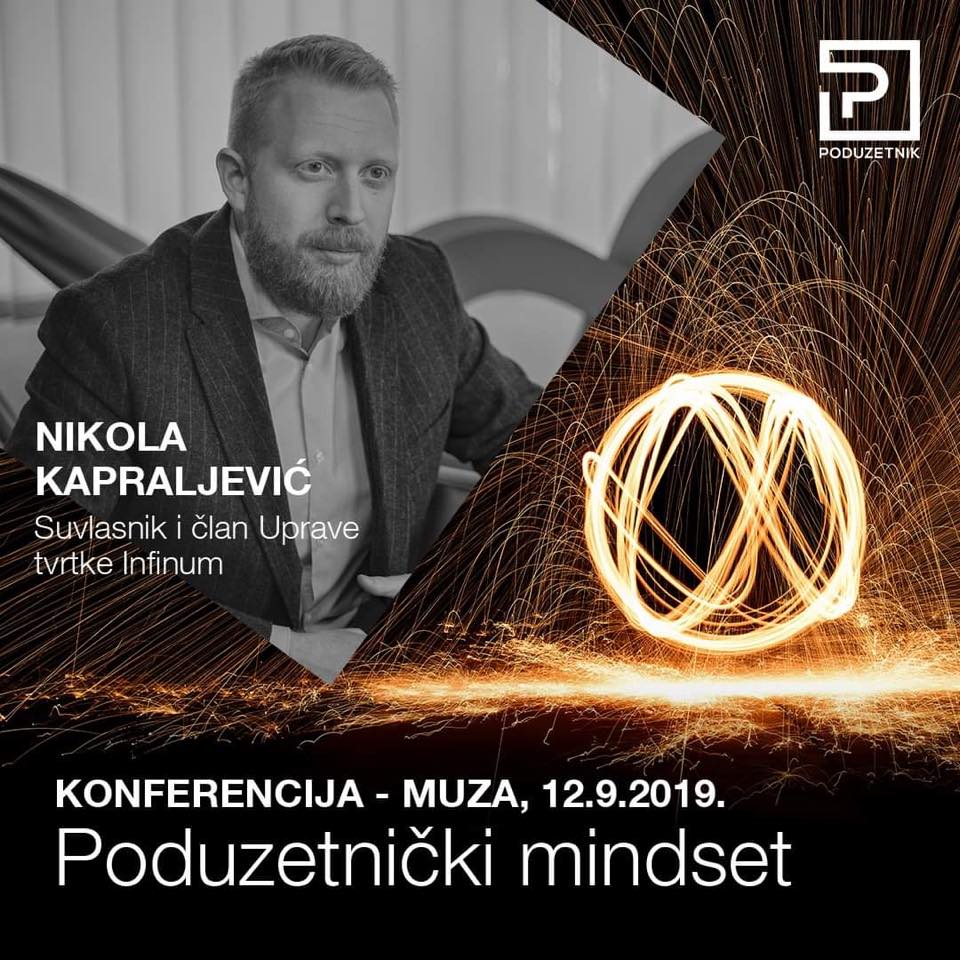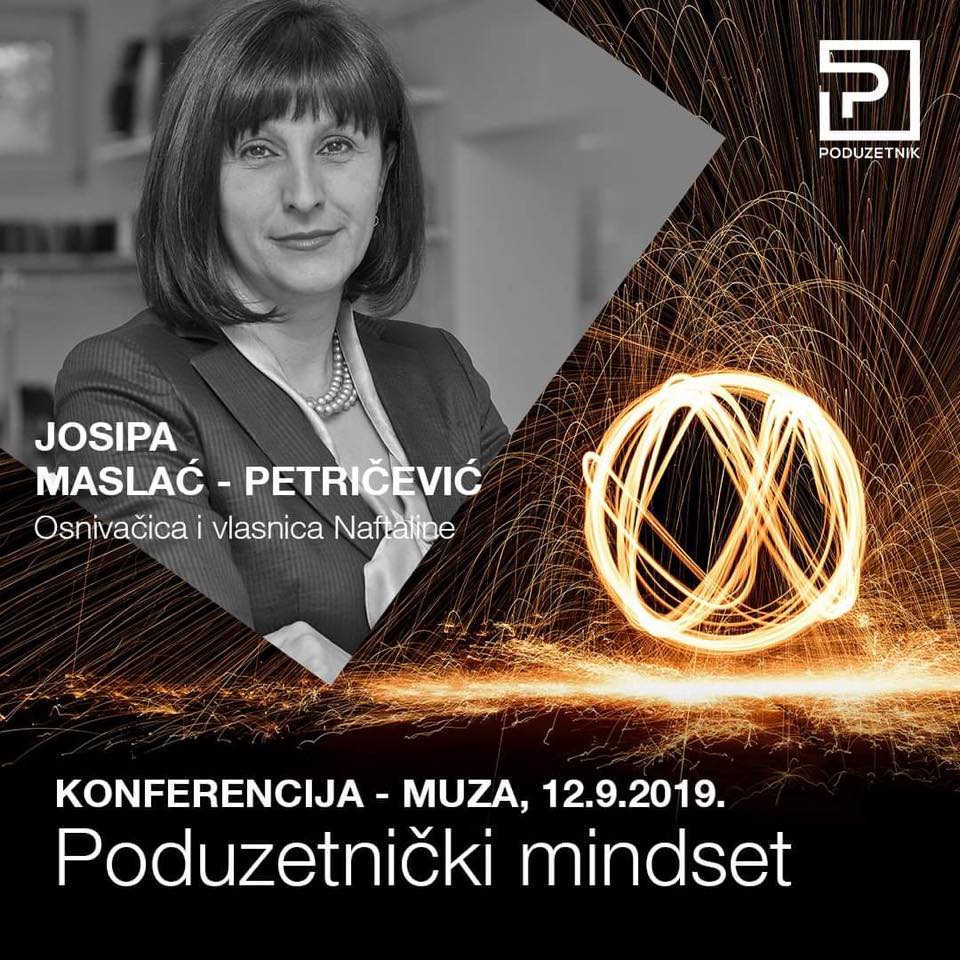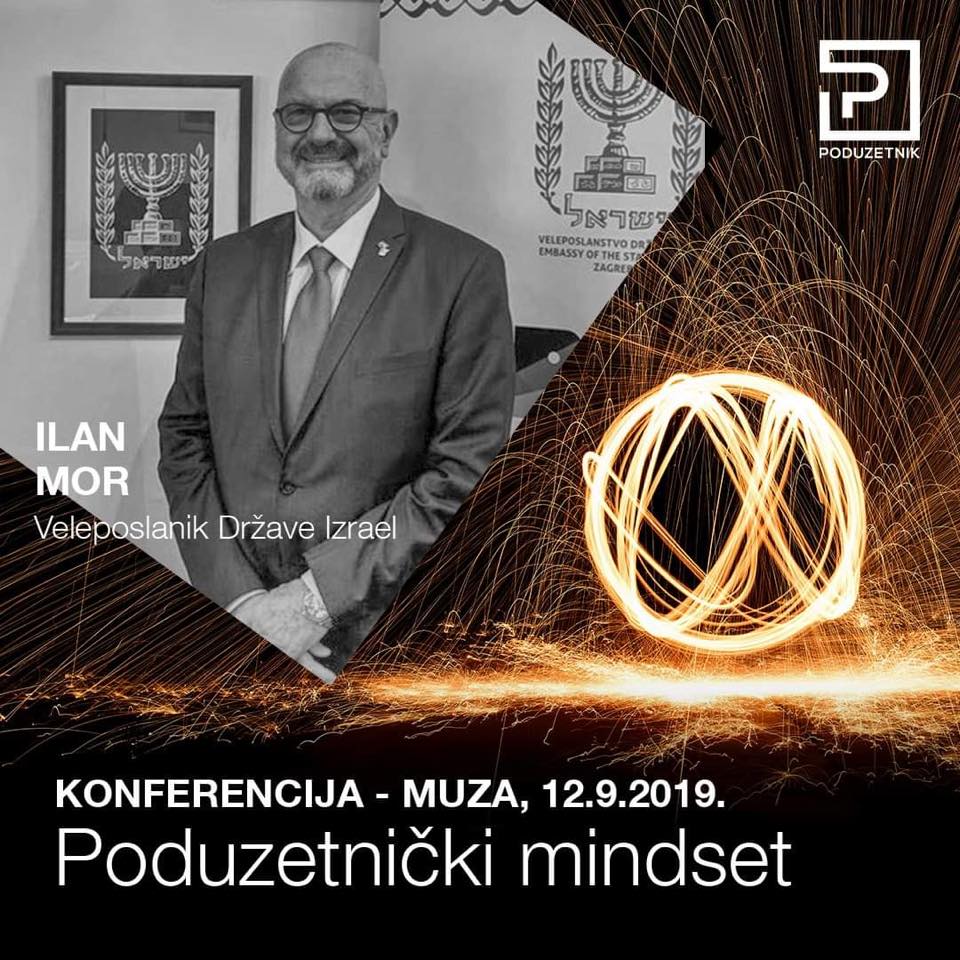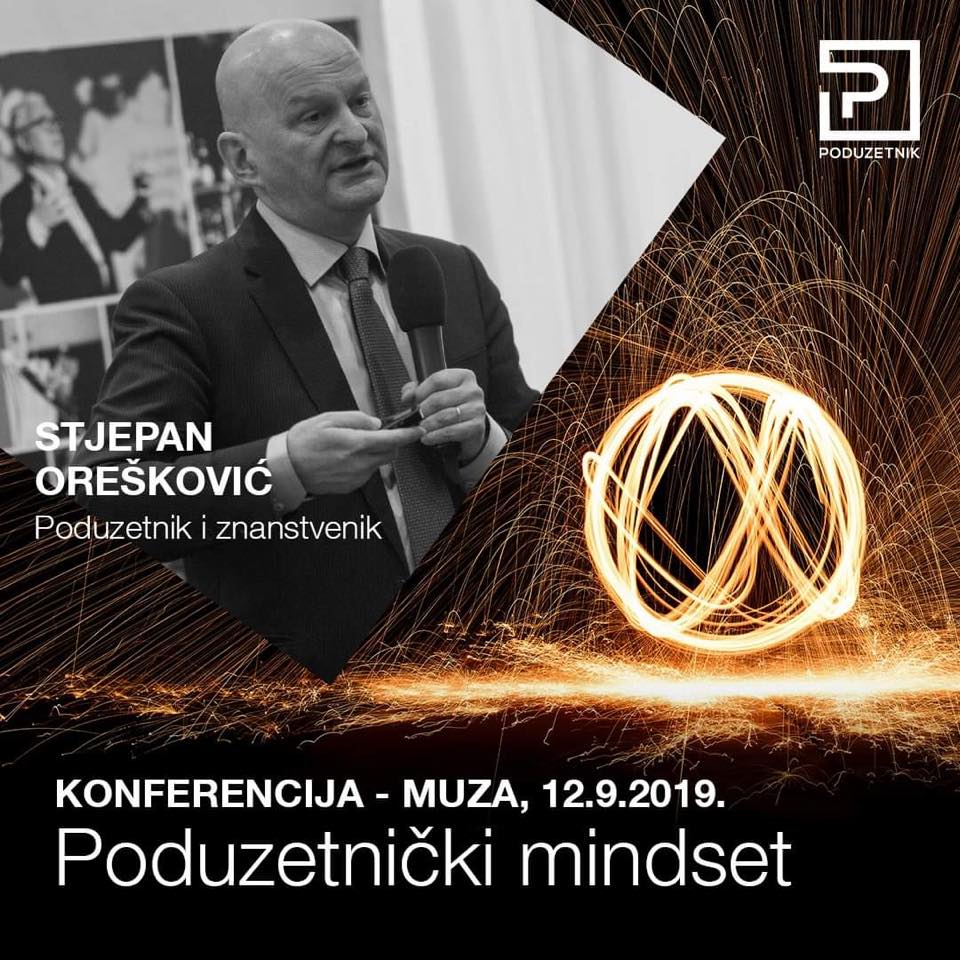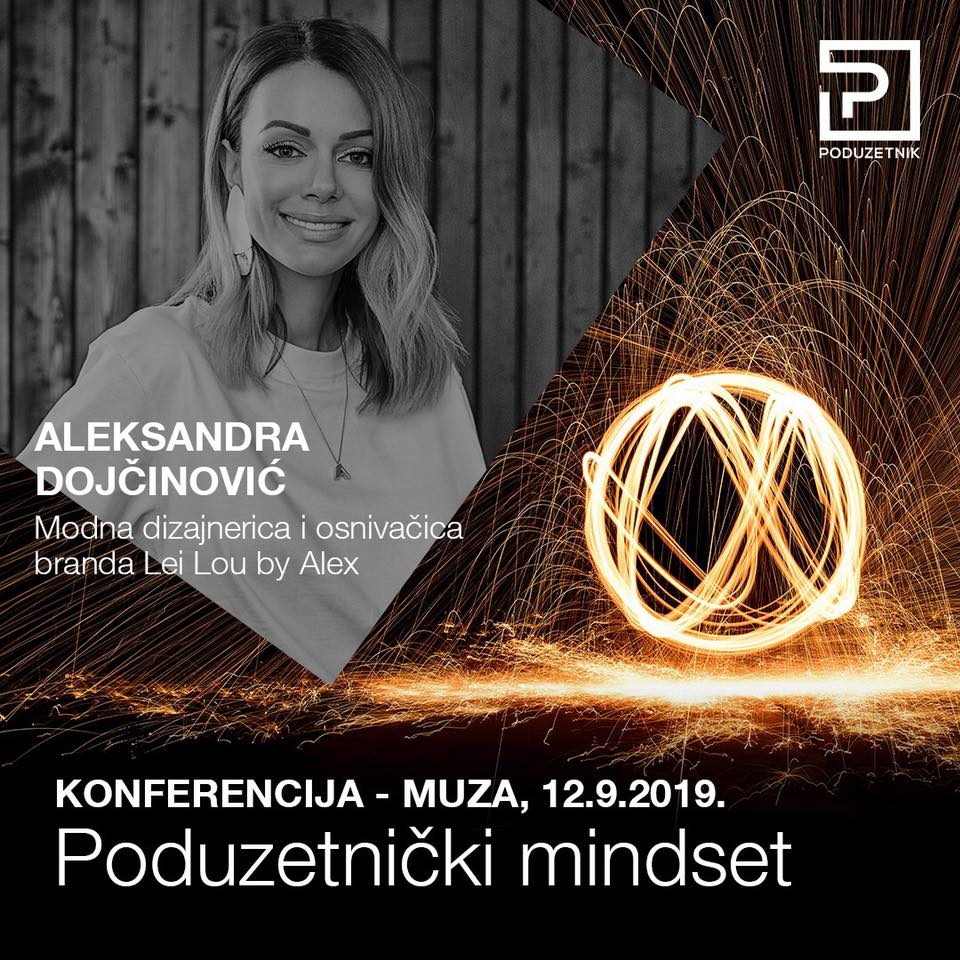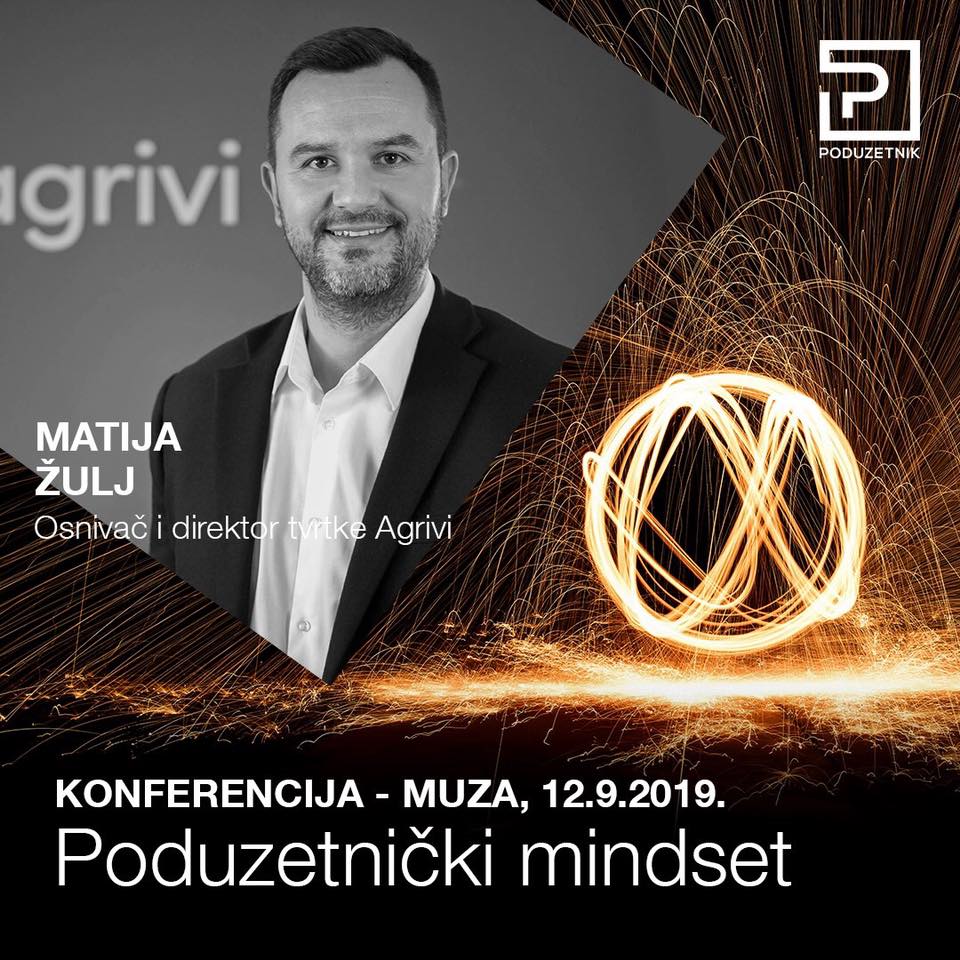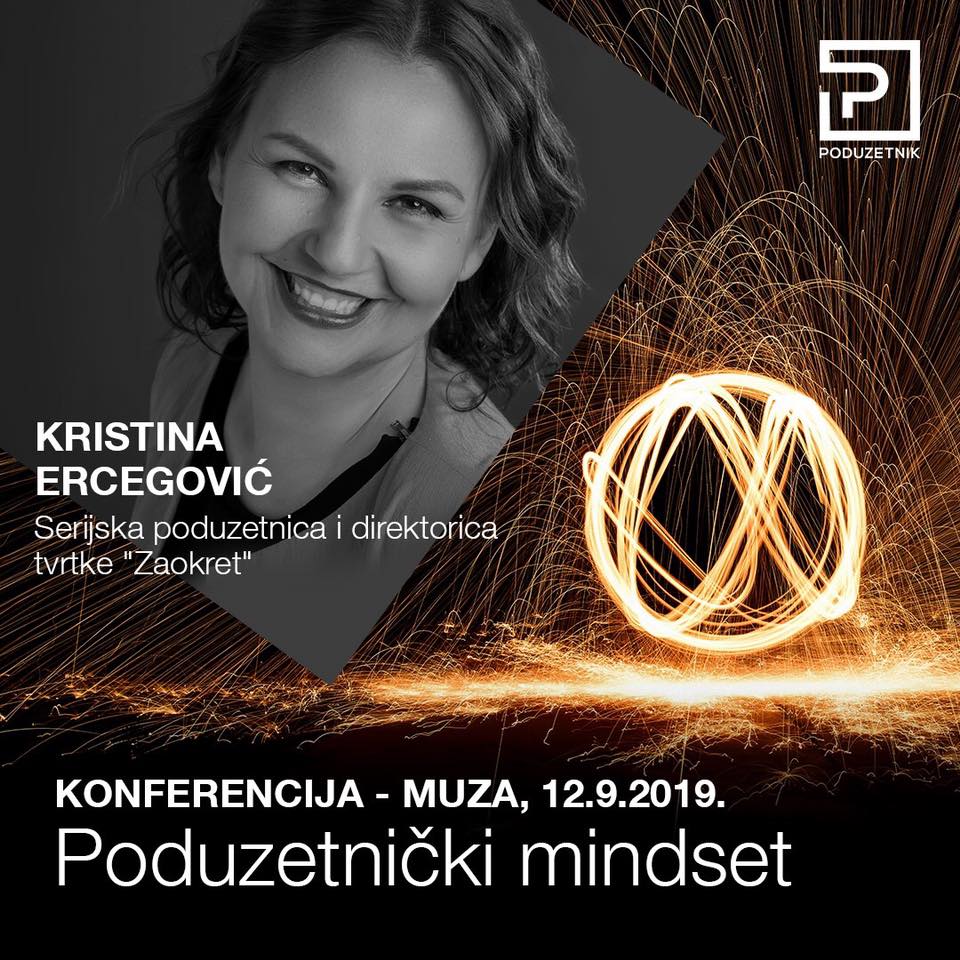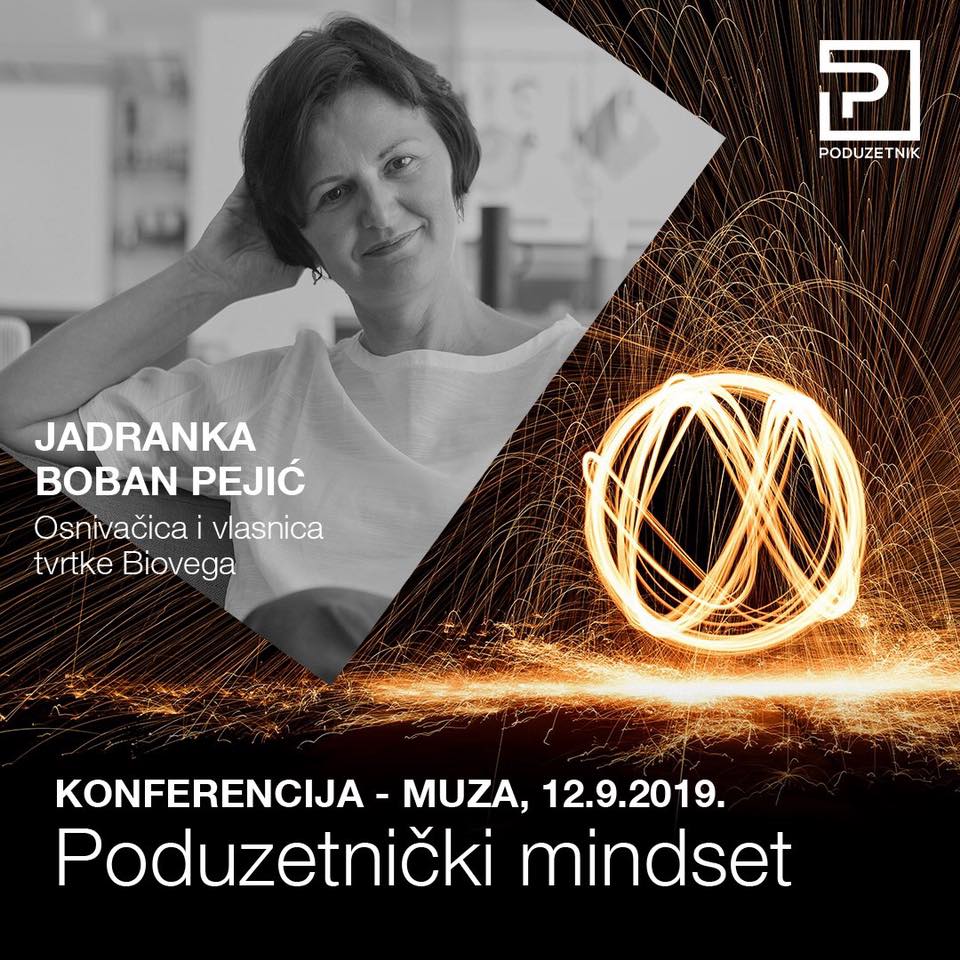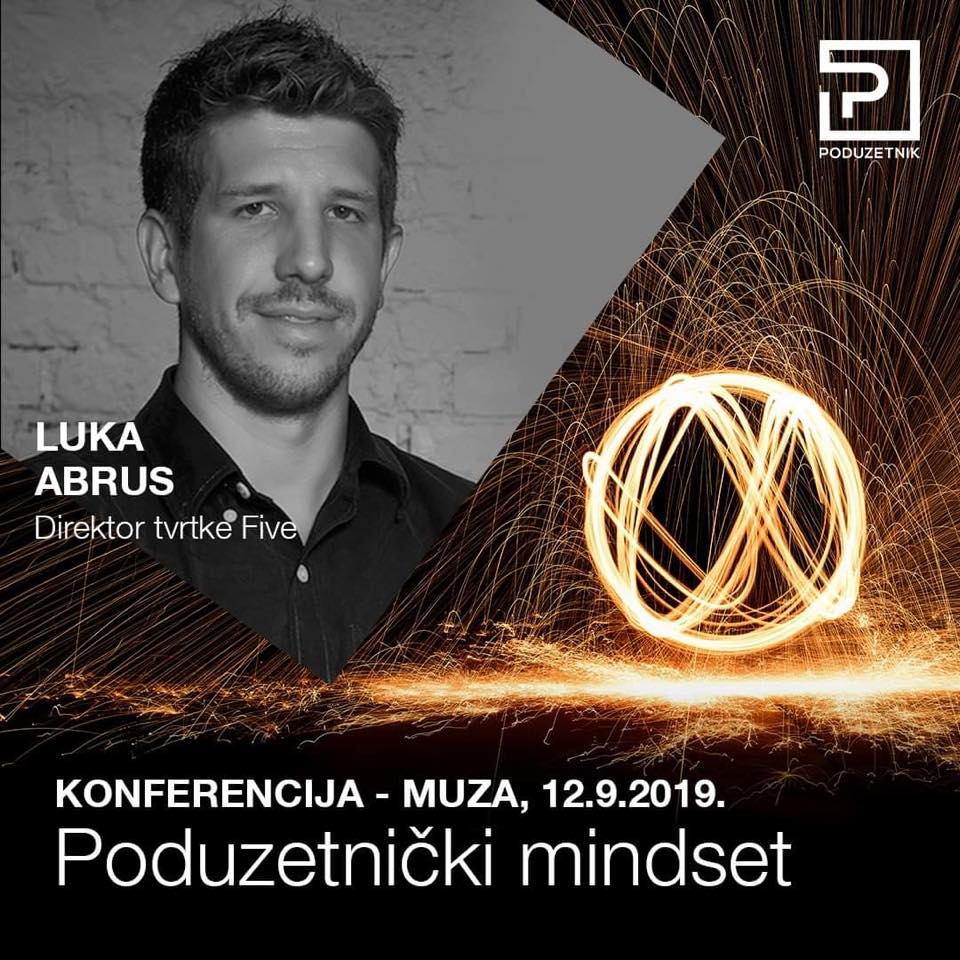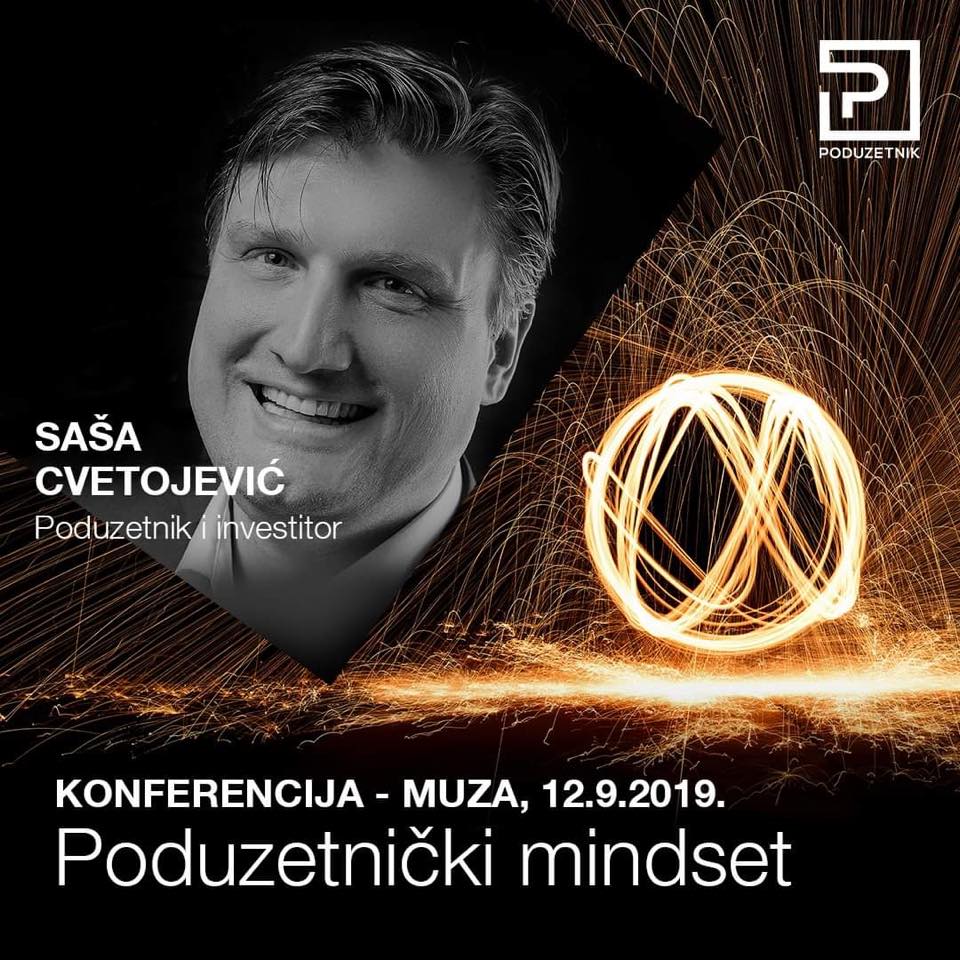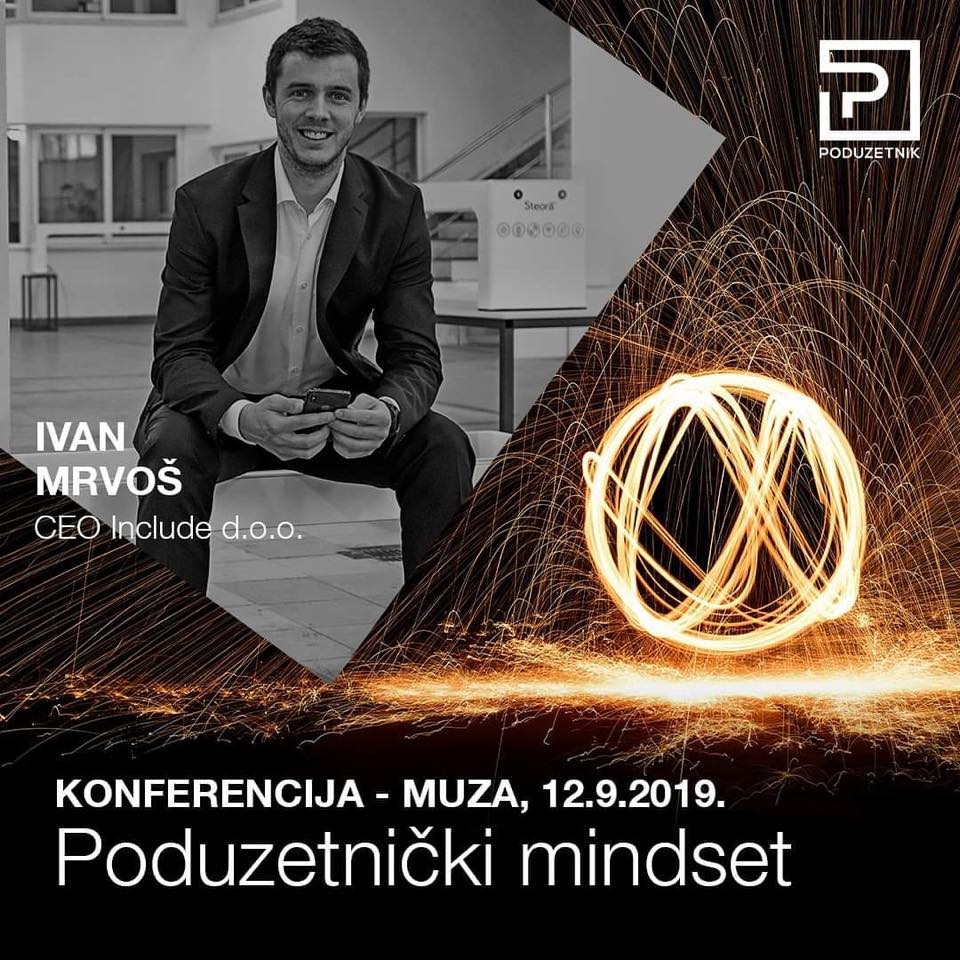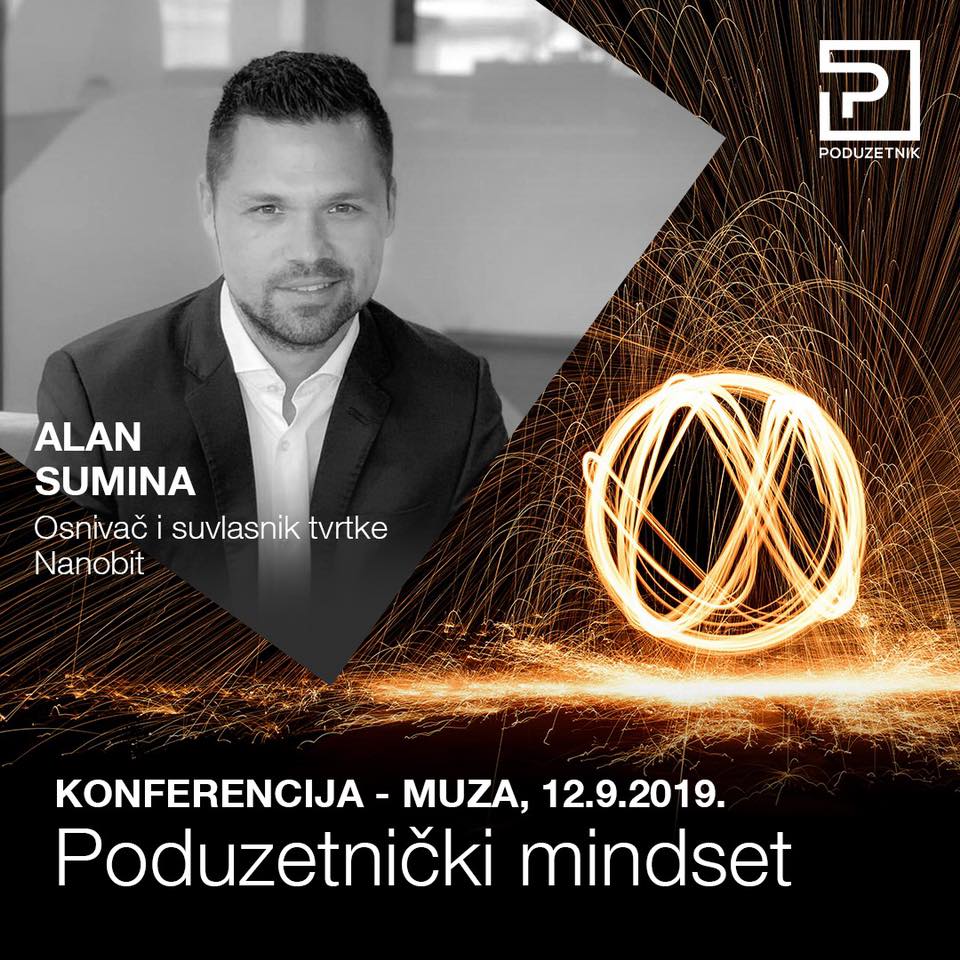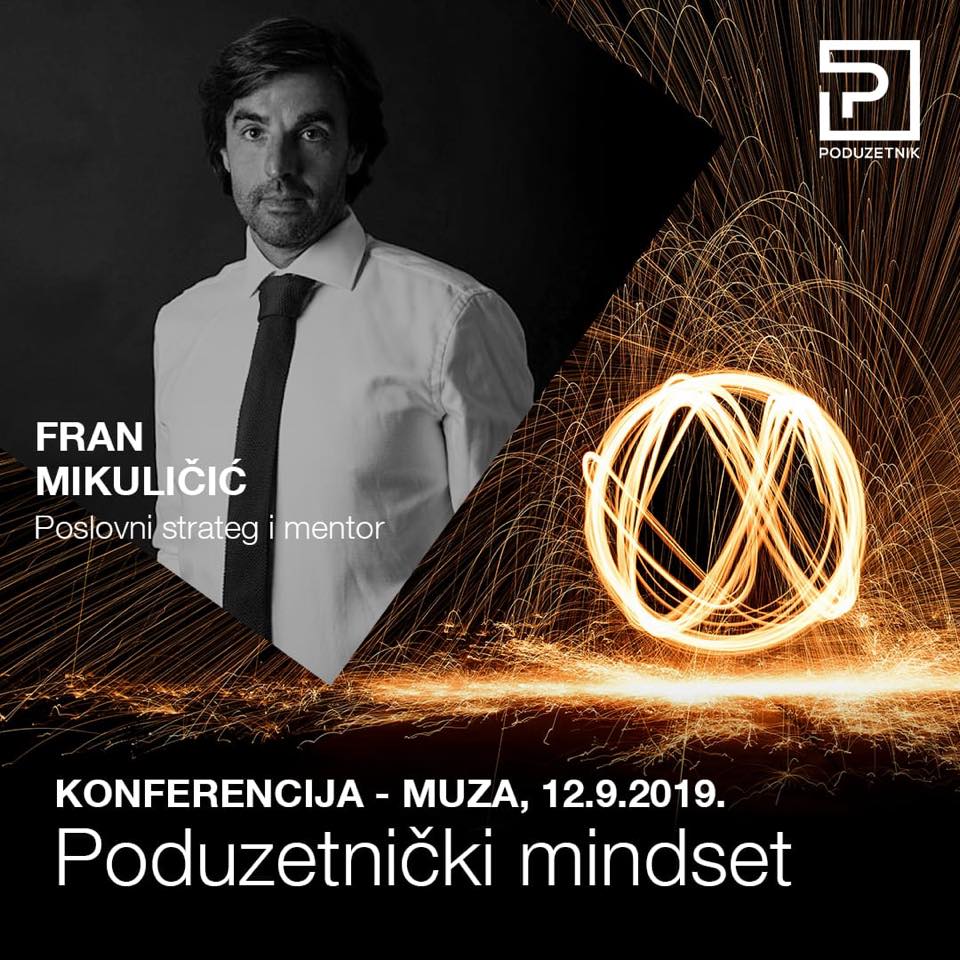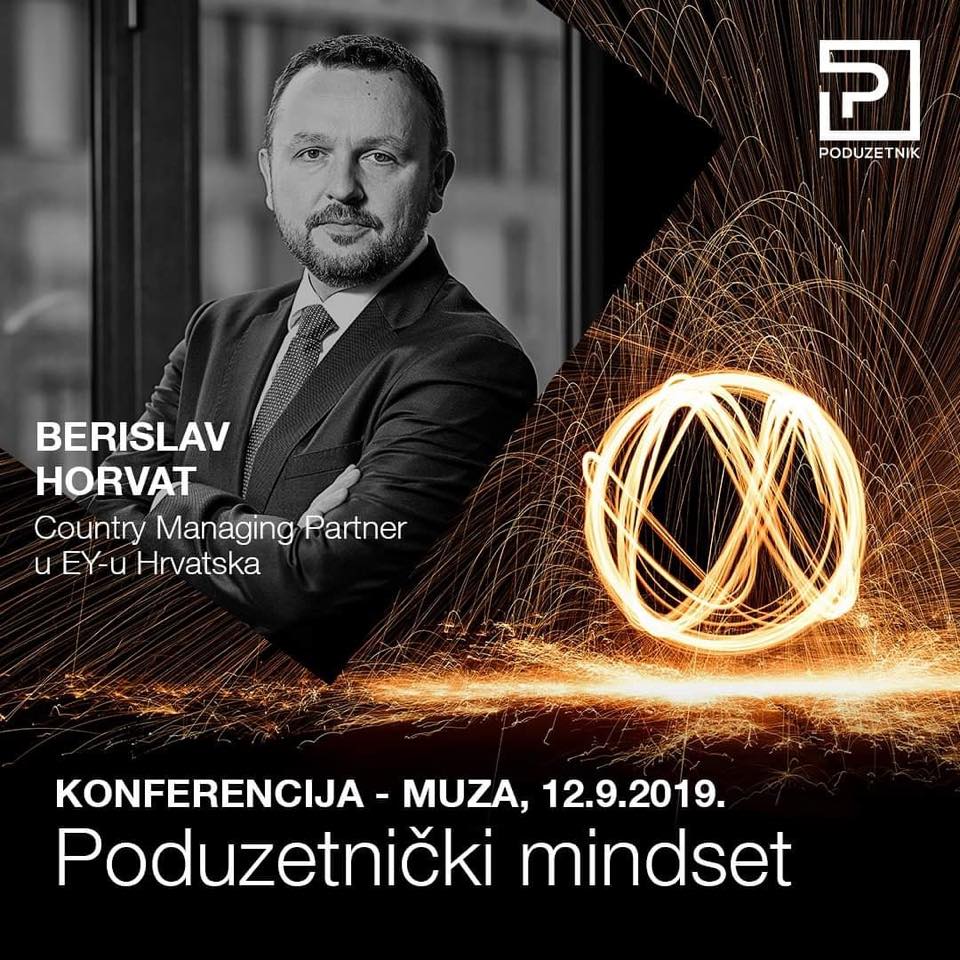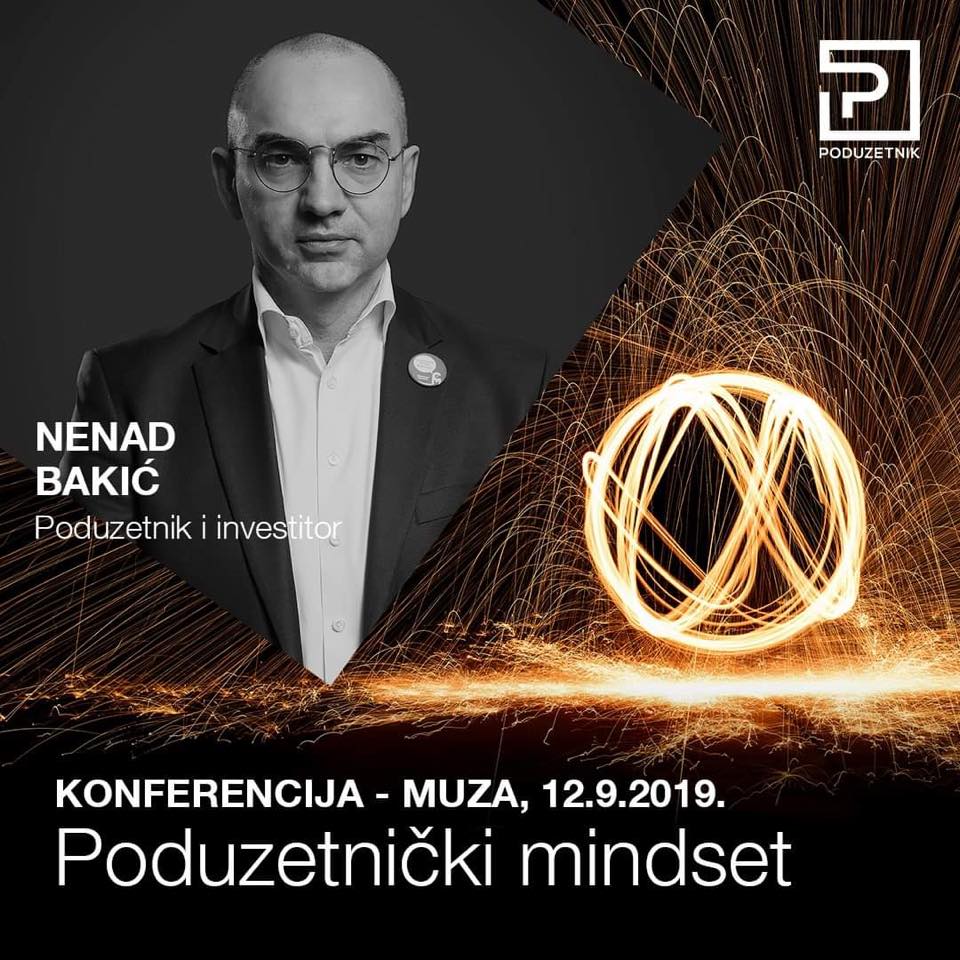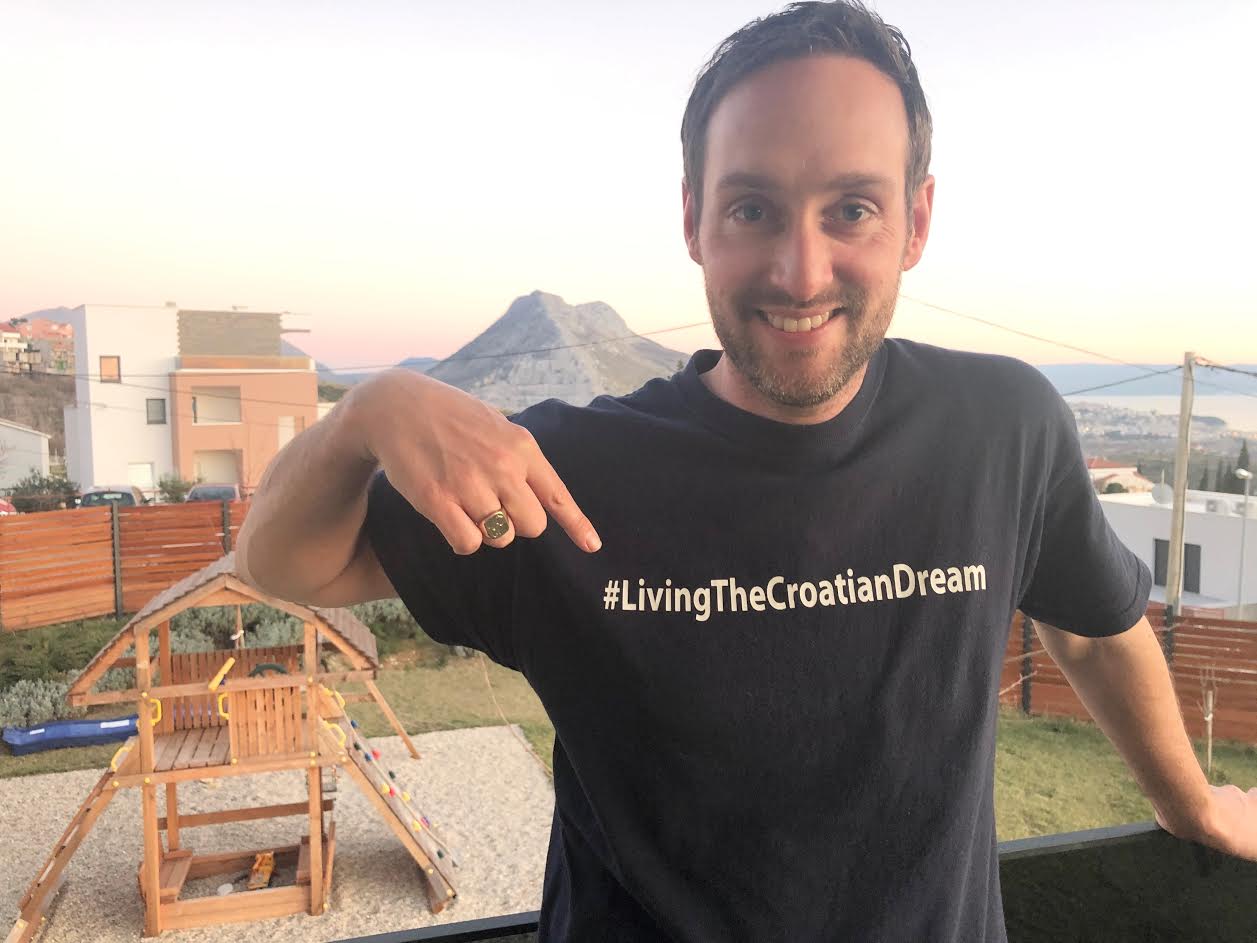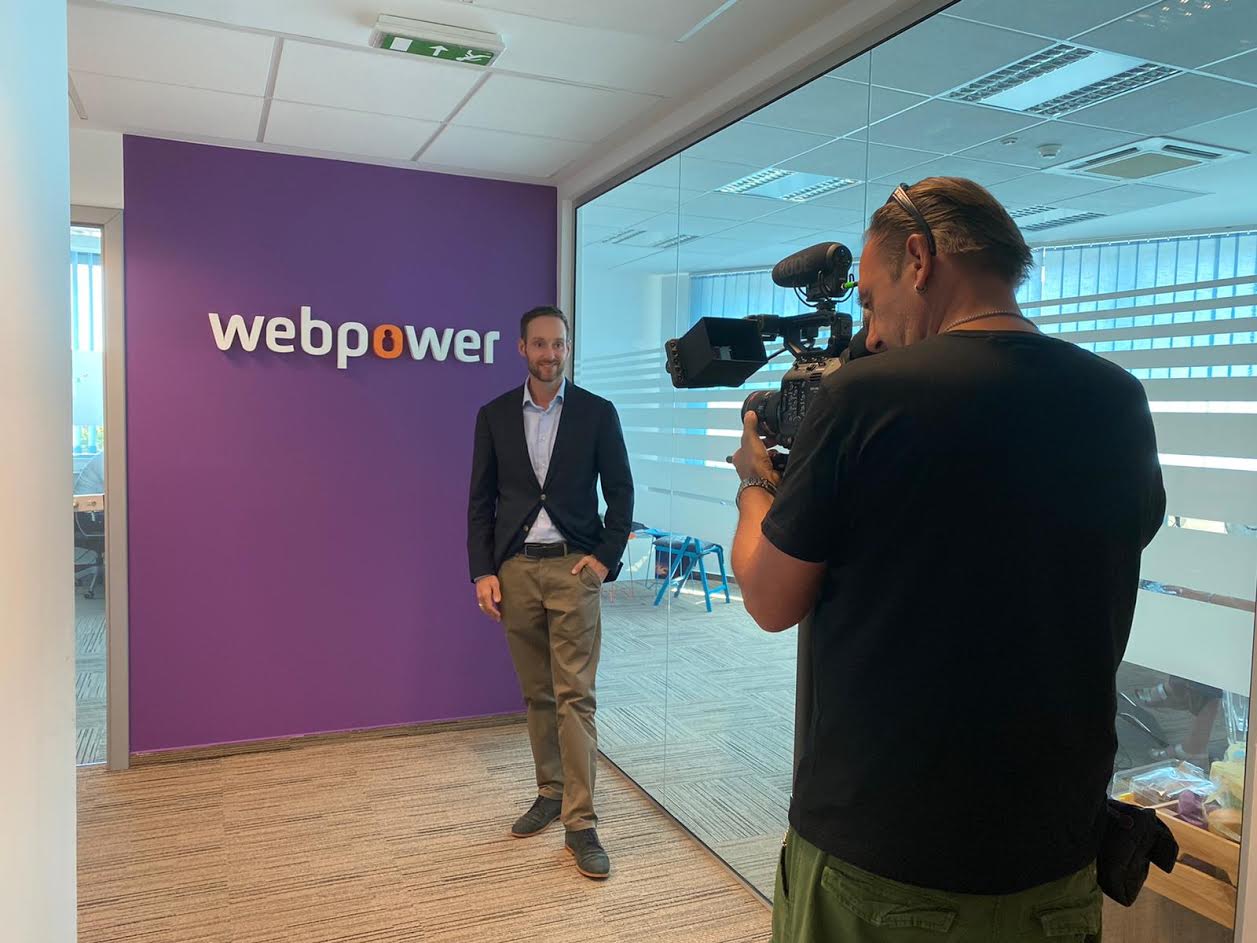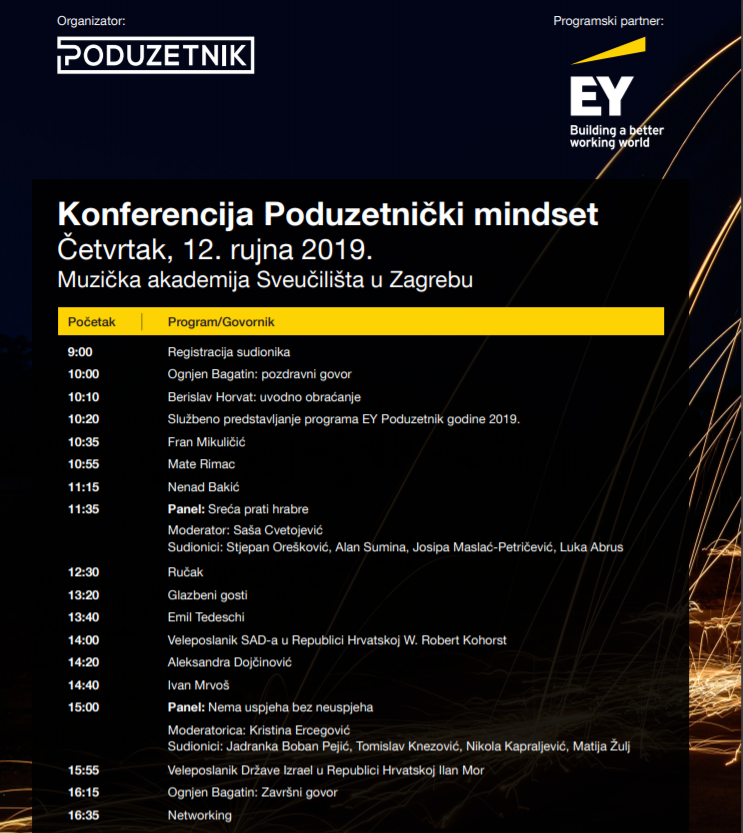Croatia 2.0 Cloaked in Positivity at Entrepreneurial Mindset Conference in Zagreb
Some of Croatia's most successful entrepreneurs gathered in Zagreb on September 12, 2019 for the first Entrepreneurial Mindset conference. It was quite a day.
About 18 months ago, I met entrepreneur Nenad Bakic for a coffee in Varazdin. During the discussion, he told me that he had decided he wanted to show me something interesting, a different view of Croatia that would surprise and inspire me.
And so it proved. A few days later, I found myself in a room with 300 people from the top of the emerging Croatian entrepreneurial class at the EY Entrepreneur of the Year dinner in Zagreb. It was probably the most positive atmosphere I have experienced during my time in Croatia, And there was only going to be one winner, man of the moment, Mate Rimac.
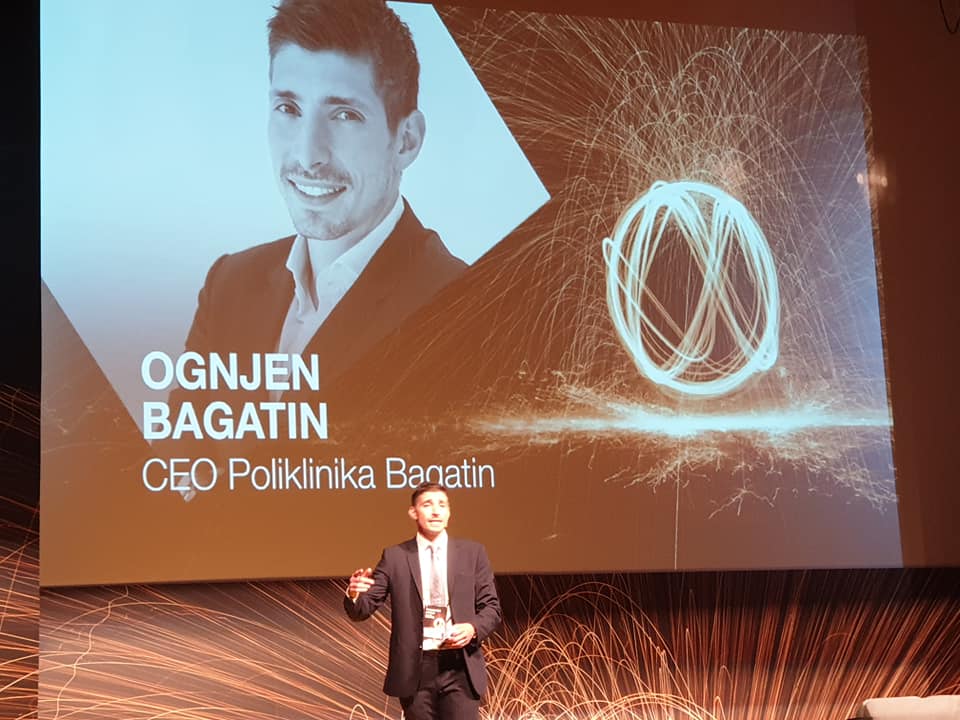
I started to look into this new breed of Croat - entrepreneurs setting up businesses in a society which was deeply embedded in the socialist mentality. And the more I looked, the more I realised that this was the most exciting story to be told in Croatia today, and not tourism. Outstanding individuals and proud Croats, forging their way onto global markets despite the overwhelming bureaucracy and negative perception of the entrepreneur in their home country.
And the more I looked, the more I was astounded by the levels of Croatia excellence on the global stage. It was not just Rimac, but many IT companies and medical tourism clinics, for example. One of the driving forces for positive change and Croatia 2.0 is Ognjen Bagatin, CEO of the hugely successful Bagatin Clinic in Zagreb and Split, as well as the man spearheading Croatia's medical tourism expansion, and also strengthening business contacts between Croatian business and its diaspora.
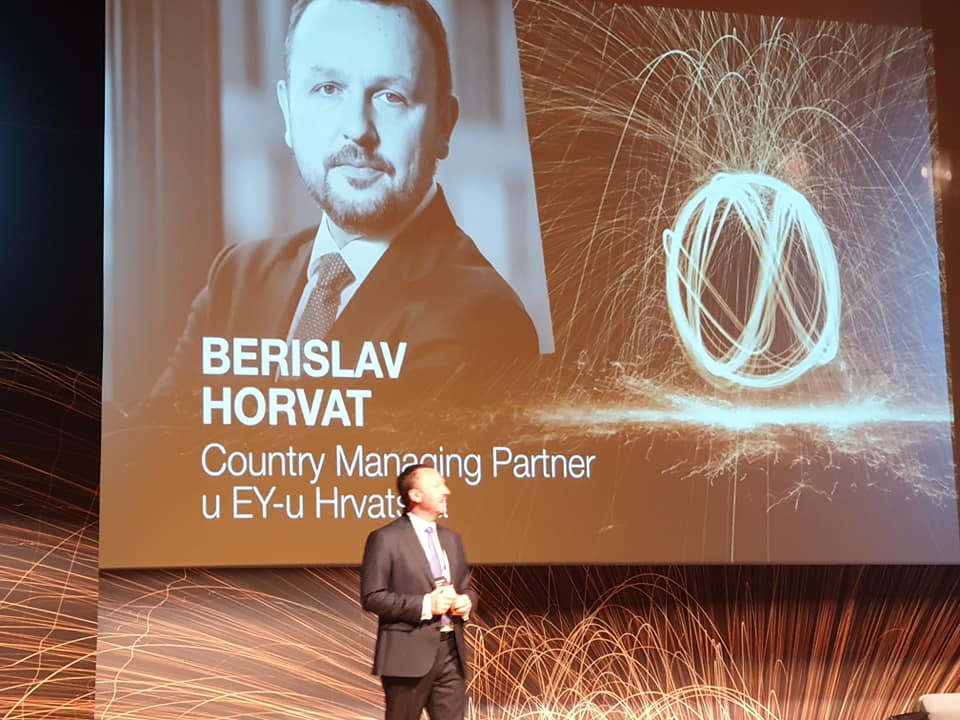
It was no surprise to learn that he and his Casopis Poduzetnik magazine was being a new conference for Croatian business - the Entrepreneurial Mindset - in partnership with EY as an extension of their successful Entrepreneur of the Year evening in March.
Both Bagatin and EY Managing Partner for Croatia, Berislav Horvat, welcomed participants to the one-day conference, which took place at the Zagreb Academy for Music.
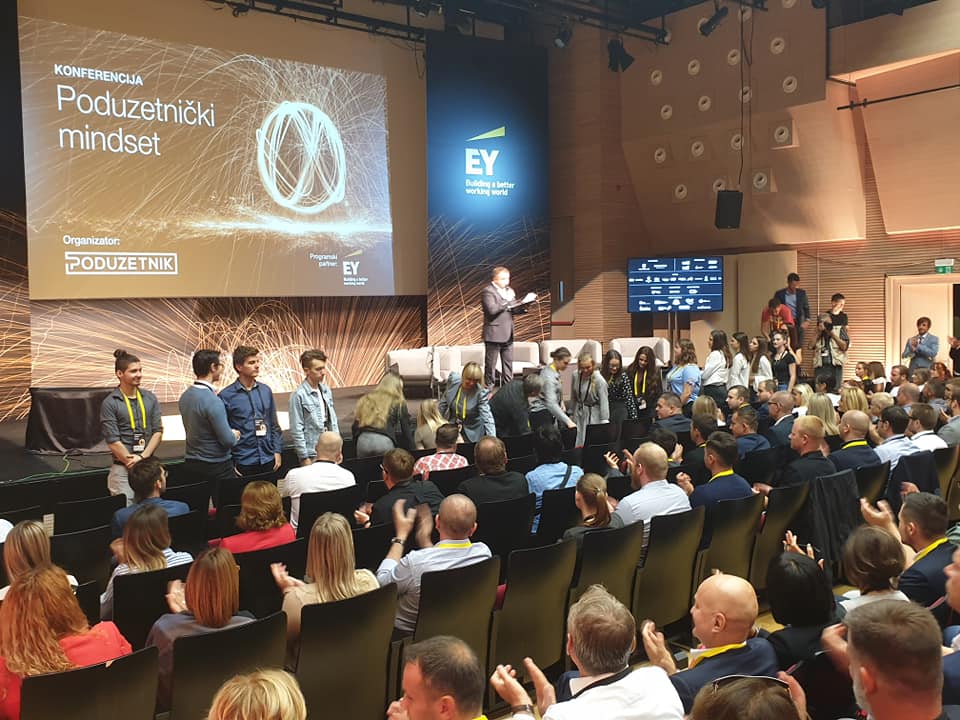
Although there was a rich lineup of distinguished speakers, the front row was reserved for the entrepreneurs of the future, some of Croatia's brightest youth who had won entrepreneurial awards and the right to take their seats in the audience. A nice and inspiring touch.
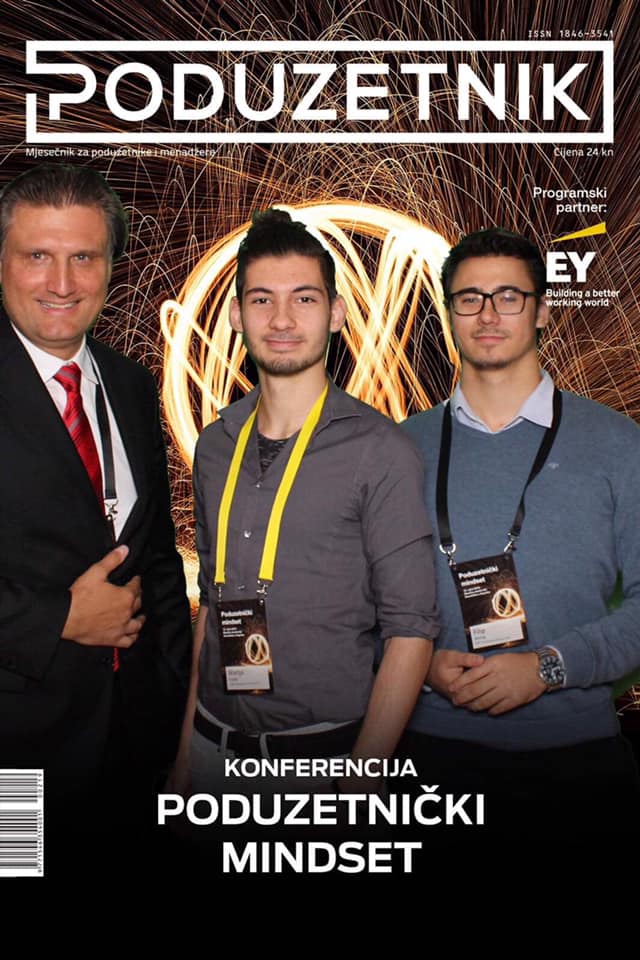
This focus on youth and the need to educate and encourage the next generation in entrepreneurial ways was a core them of the day. Speakers were encouraged to talk of their failures and explain that rather than being a disaster, failure is a necessary step on the road to success, assuming one learns from those failings.
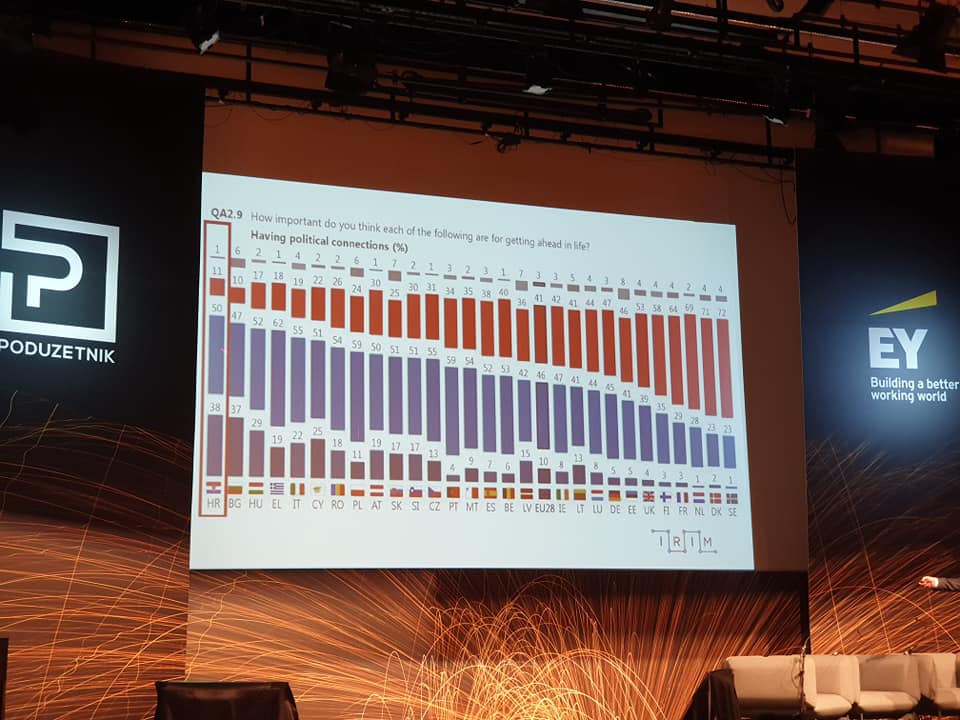
Nenad Bakic laid out the scale of the problem in a few simple slides on perceptions of EU citizens.
How important do you think having political connections is in getting ahead in life? Croatia tops the EU!
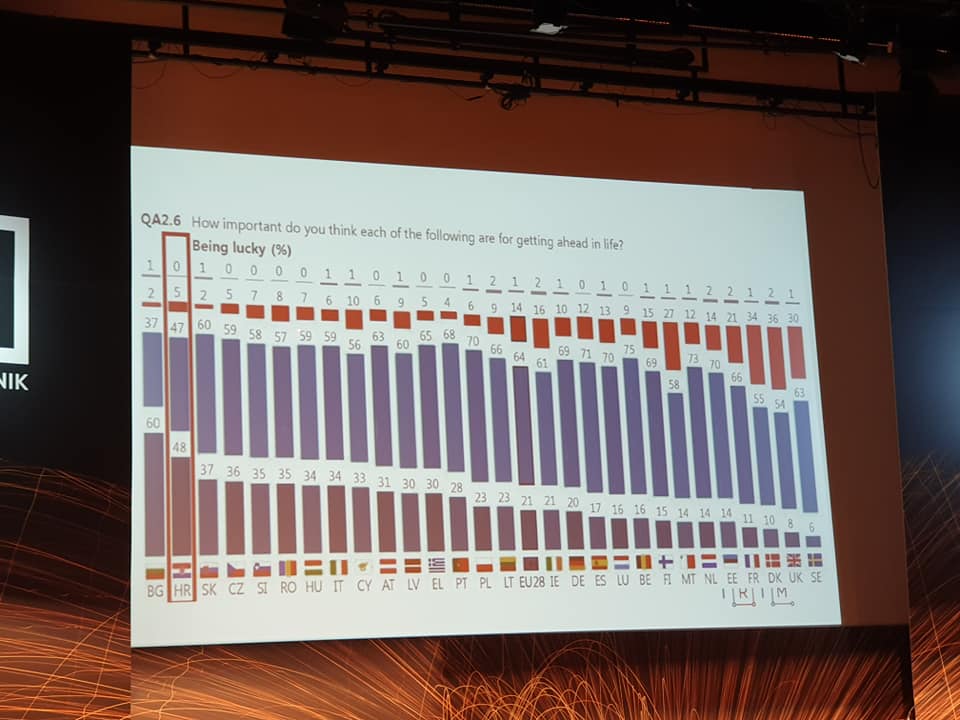
How important is being lucky to getting ahead in life? Only Bulgaria feels the luck factor more.
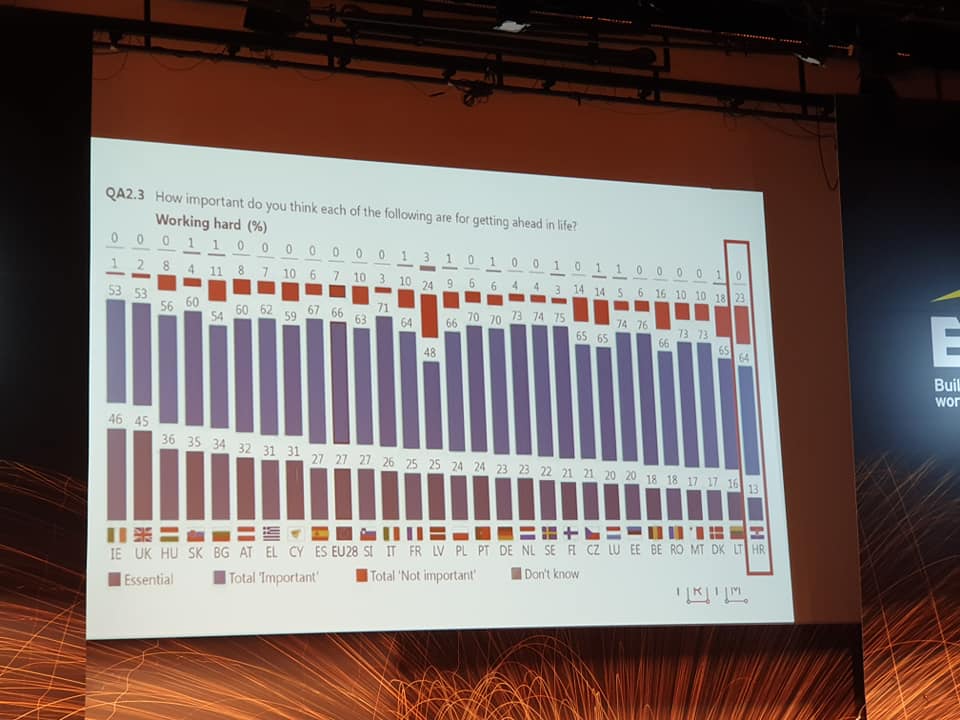
But when it comes to the importance of working hard, Croatia is bottom of the league.
By contrast, Luka Abrus from Five told the conference that 'I find that the harder I work, the luckier I get.'
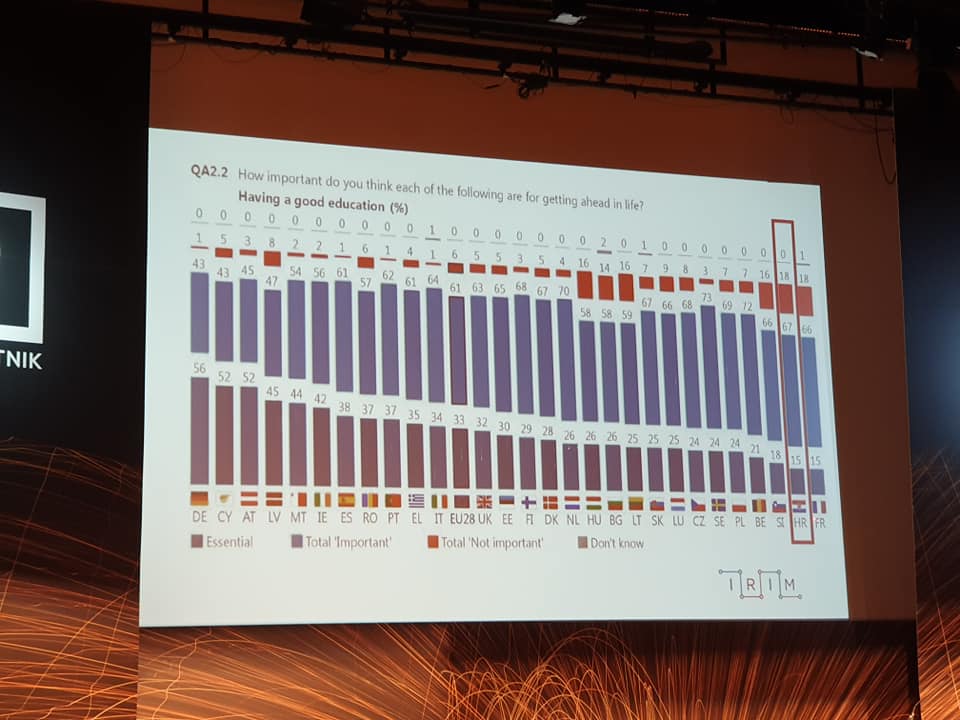
Along with working hard, the importance of education is not highly valued in Croatia, with only the French deeming it less important.
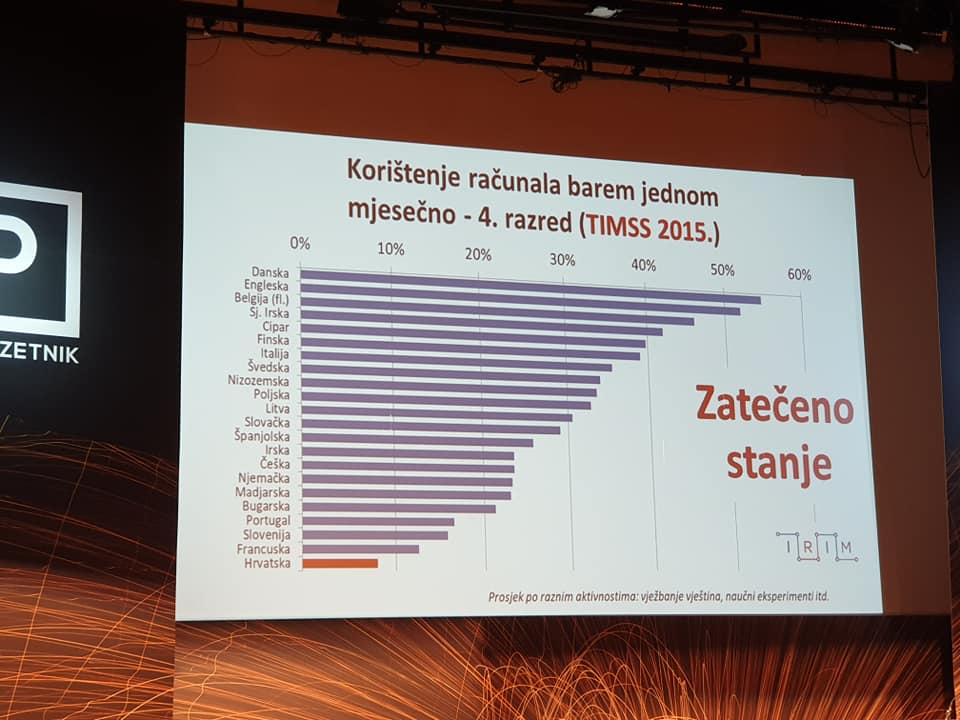
And when it comes to learning computer skills, Croatia is bottom again on the list of countries where kids in 4th grade use computers at least once a month.
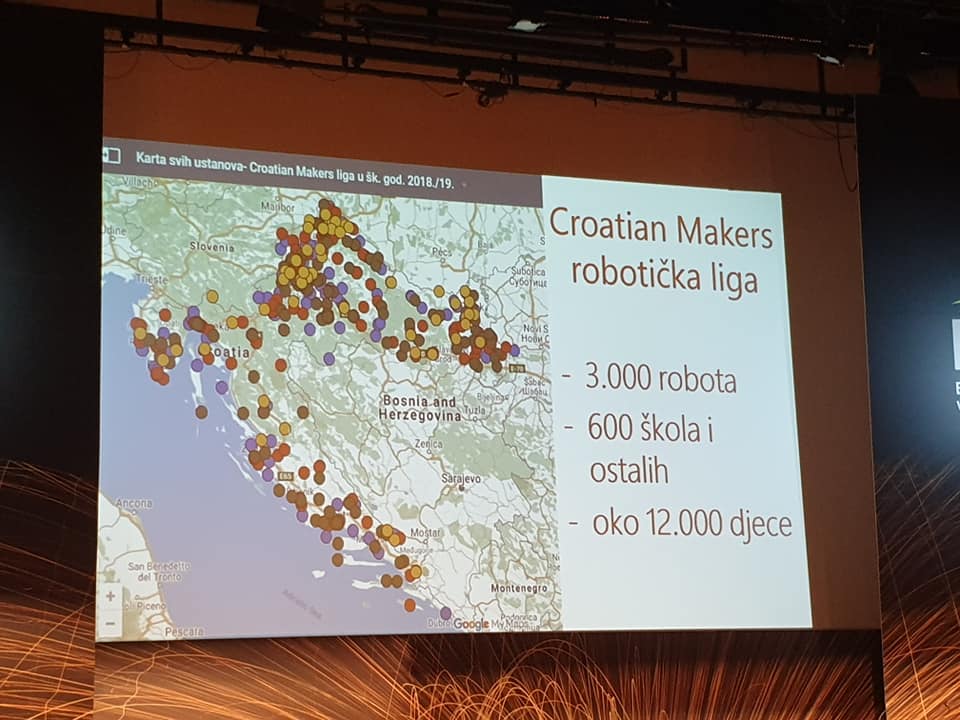
Some of the key messages of yesterday's conference were the need to share success strories to help potential entrepreneurs see that there is another way, to share and celebrate failures as a necessary path on the road to success, and to focus on education, education, education. Nobody is doing more in that regard than Nenad and Rujana Bakic with their STEM Revolution and Robotics League, which is already reaching a majority of schools in Croatia. I have written about this before, so click here to learn more.
The conference was a sell-out with a waiting list of over 200 people, and there was a great atmosphere as entrepreneur after entrepreneur took the stage to tell their stories and share their know-how. One of the most eagerly awaited presentations was from Mate Rimac, whose meteoric rise in just a few years has made him a global icon in the car industry.
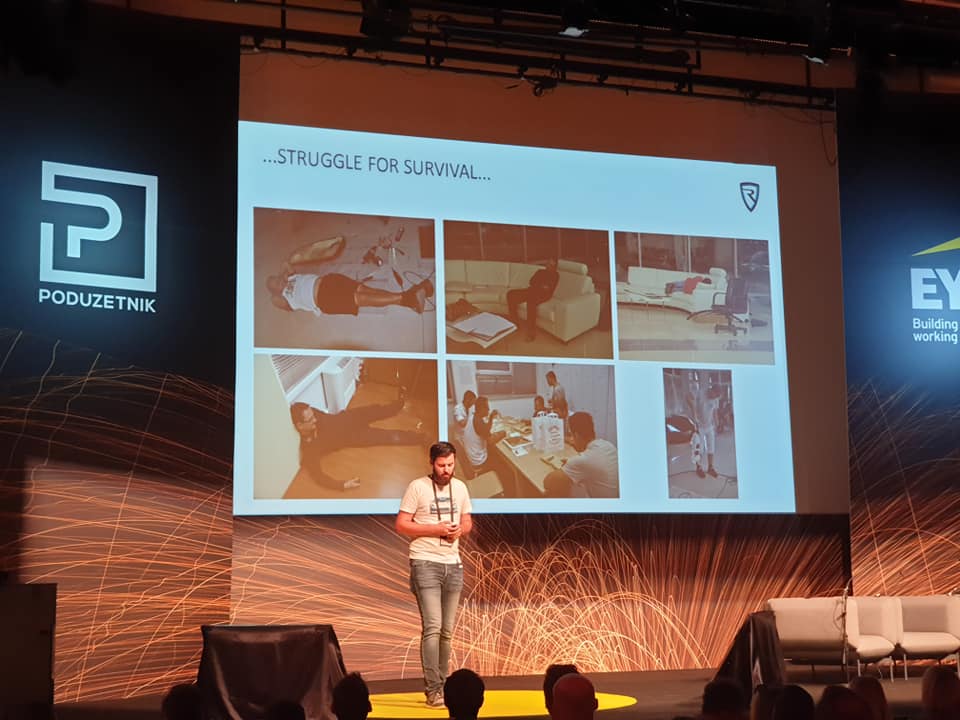
It was only a few years ago that those passionate early pioneers at Rimac Automobili were sleeping on the floor...
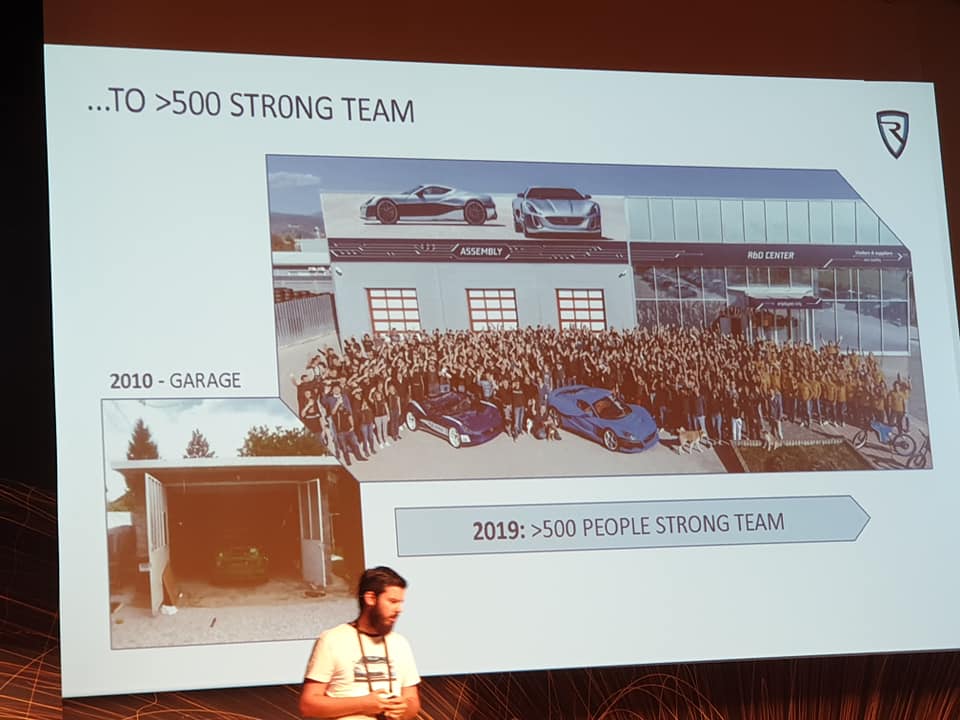
From 2010 to 2019.
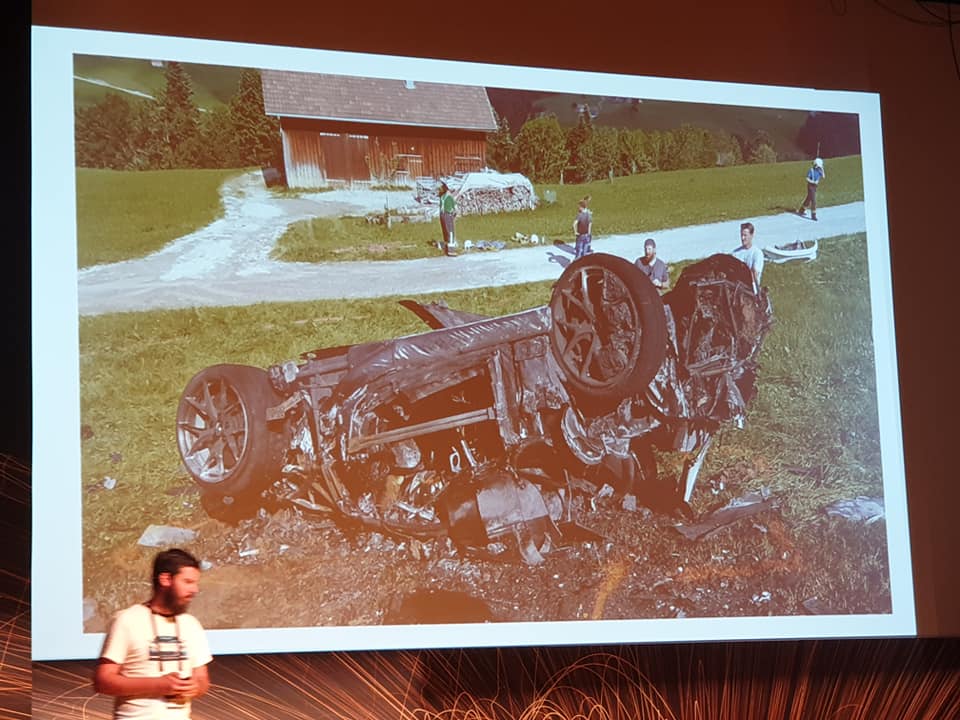
There were many highlights along the way, as well as THAT Richard Hammond crash, during which Rimac told the audience he aged 10 years.
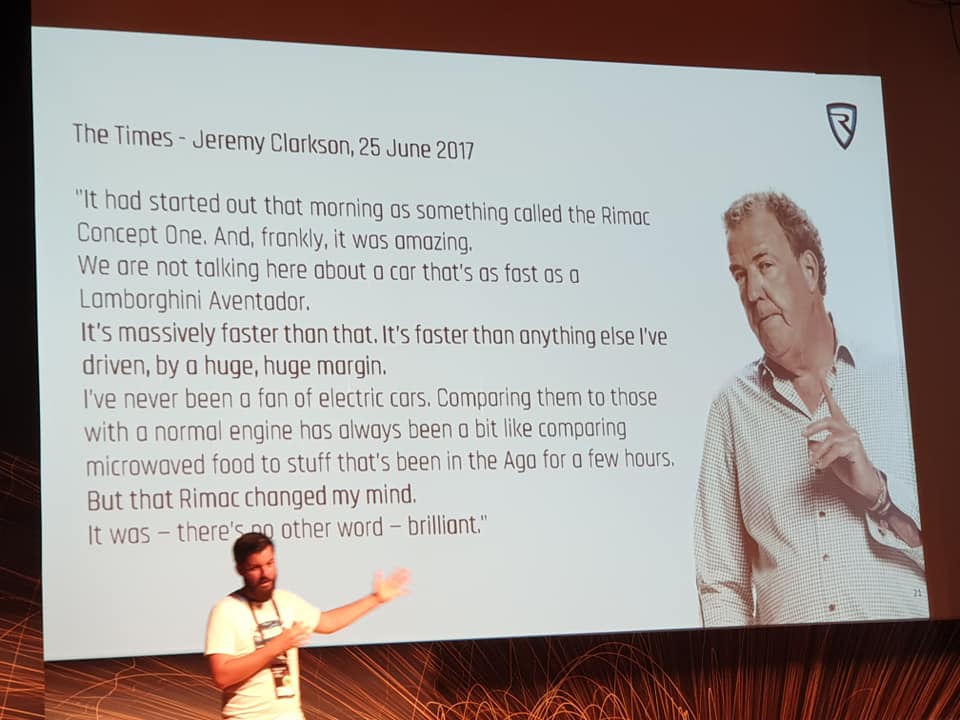
But of the many positives, there can be few more important endorsements than this.
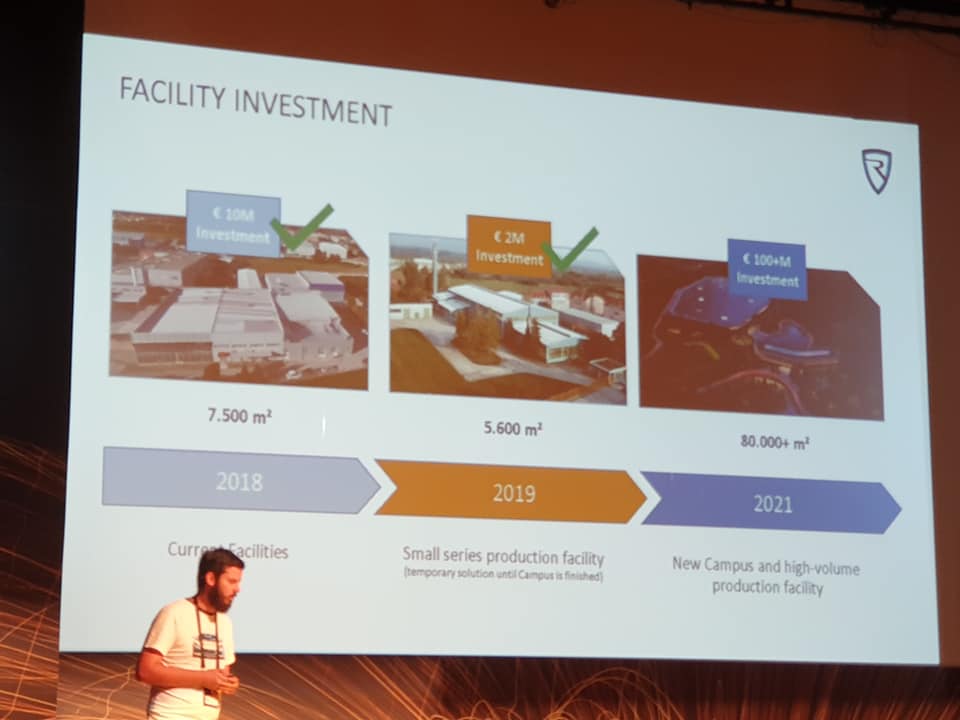
I have meet Rimac a few times, but this was the first time I had heard him speak about his business. What was impressive was his focus, and not on what he had achieved, but where he was going. A fabulous contribution to this most inspiring of days. I will do a feature later on his comparison of Craotia and Slovakia and the potential of a car industry - it was seriously interesting.
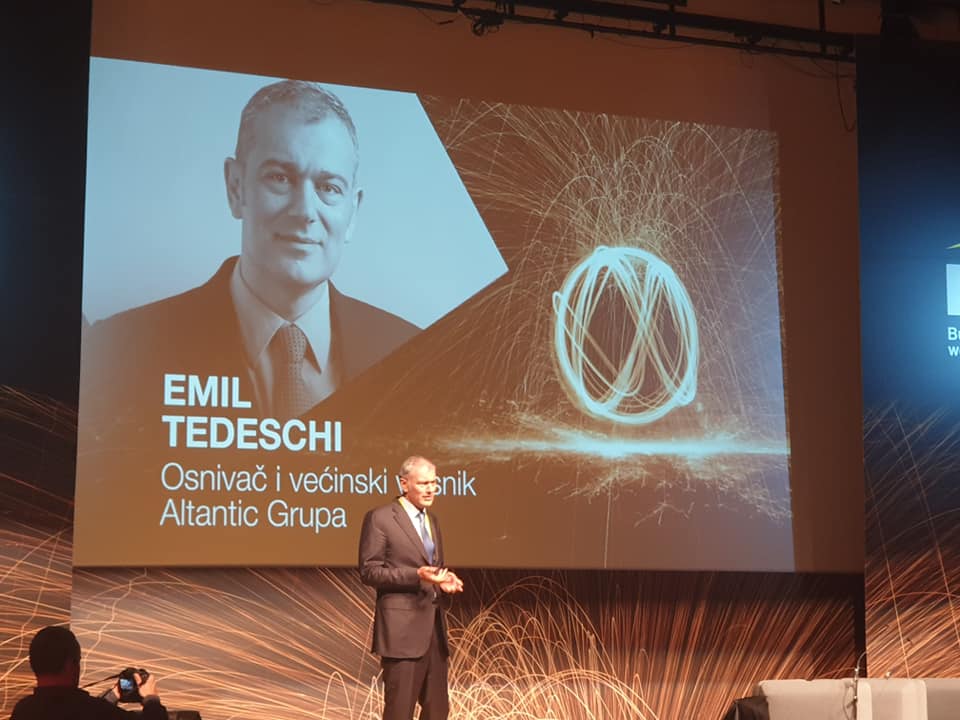
There were no prizes for guessing which speech caused the most waves. Atlantic Grupa CEO Emil Tedeschi was on the homepage of most Croatian news portals within hours of his speech after a typically forthright presentation. You can read more about the reaction here.
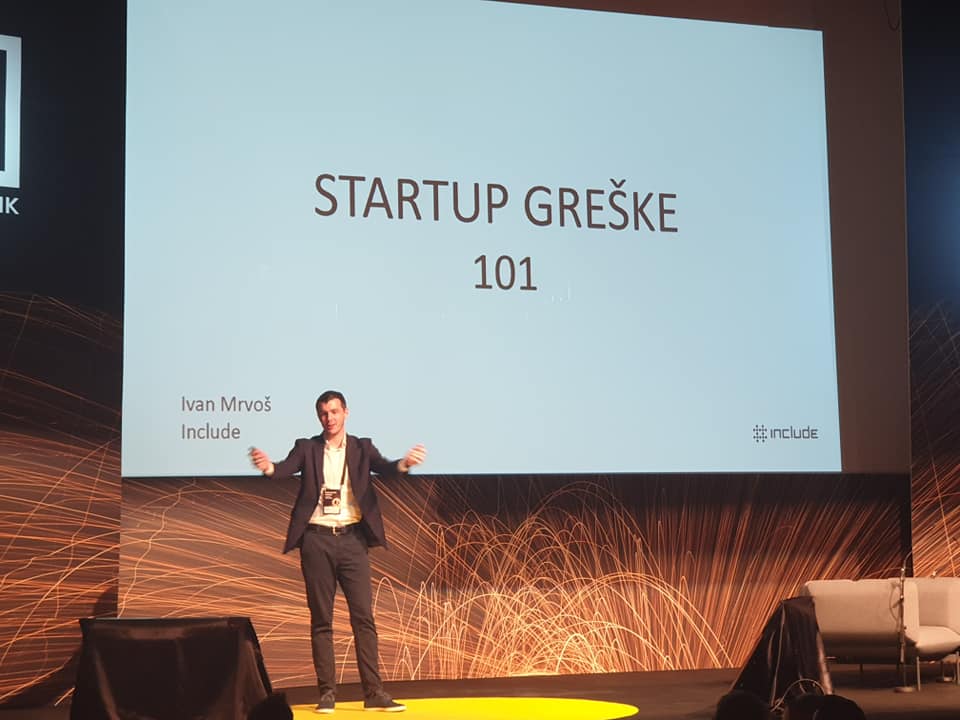
The youngest entrepreneur on the stage, 24-year-old Ivan Mrvos from Solin, attracting the most audience participation, who gave a brilliant overview of Startup Mistakes 101.
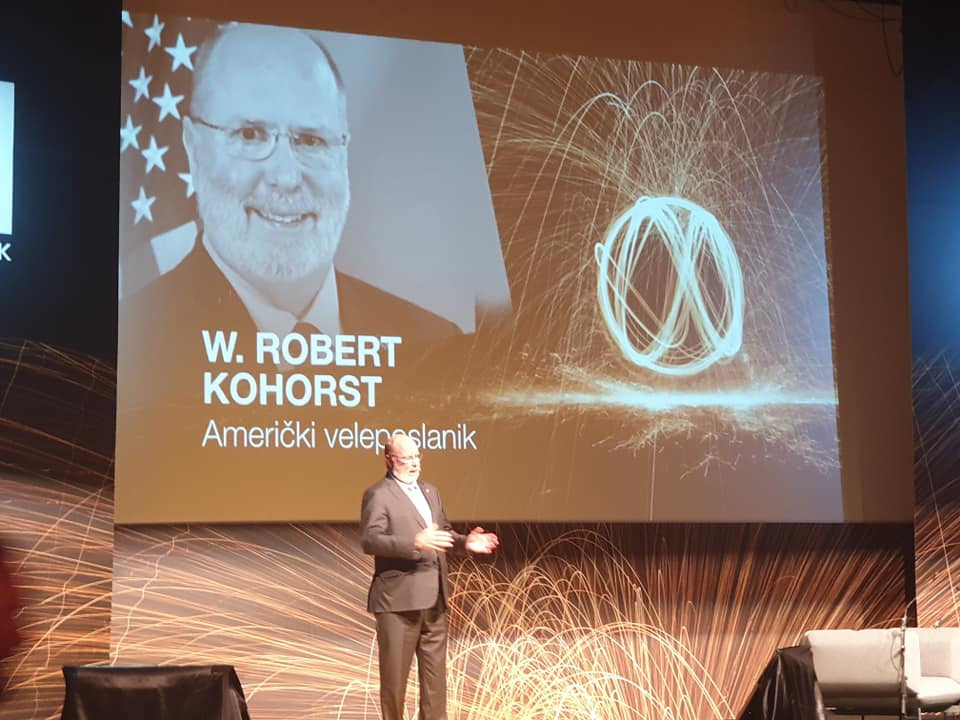
Croatia's entrepreneurs have been strongly supported by US Ambassador Robert Kohorst in the past, and Kohorst was a keynote speaker taking about his own entrepreneurial journey before joining the diplomatic corps, including his biggest failure, a $4 million investment into an online vetinerary business.
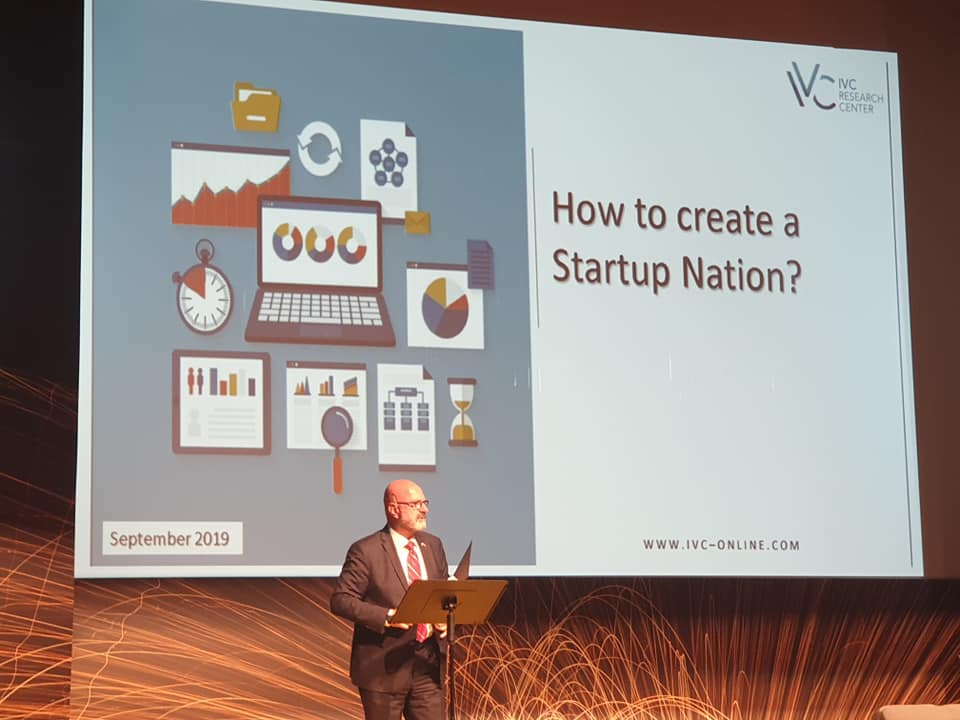
Kohorst was not the only ambassador to address the audience. Israeli Ambassador Ilan Mor talked about the Israeli experience and how to create a startup nation. With less than friendly neighbours and a culture of self-reliance, necessity had become the Israeli mother of invention.
The first Entrepreneurial Mindset conference was merely the start. In his closing remarks, Ognjen Bagatin announced that there would be four more conferences in the coming 12 months - in Osijek, Rijeka, Split and Zagreb - aimed specifically at encouraging entrepreneurial seeds in the next generation.
Mate Rimac presentation in full:
Nenad Bakic presentation in full:
You can see more of the conference presentations here.
To learn more about entrepreneurial intiatives in Croatia, follow the Casopis Poduzetnik Facebook page.
Meet some of the speakers at the conference in these TCN interviews over the past few days.
Entrepreneurial Mindset: Meet the Speakers - Matija Zulj
Continuing our look at the speakers for this week's inaugural Entrepreneurial Mindset conference in Zagreb on September 12, 2019. Next up, Matija Zulj from Agrivi.
It quickly sold out and there is a waiting list of hundreds should tickets become available. This week's Entrepreneurial Mindset conference in Zagreb is the first of its kind in Croatia, and it includes a top draw list of speakers, several of the most successful entrepreneurs in the country. TCN will be covering the event and we continue our series interviewing some of the key speakers. Our latest guest is Matija Zulj, the CEO and founder of Agrivi - a global farm management software company with a vision to change the way food is produced, positively impacting over a billion lives. Agrivi is one of the key global leaders in the industry - recognized by over 30 major industry market research companies and trusted by 40.000+ customers worldwide.
1. As a Brit, I notice that entrepreneurs are not embraced and supported as much in Croatia as they are in countries with a longer capitalist tradition. How does it feel being an entrepreneur here, and how did you decide to embark on this road less travelled?
Good ideas can be born anywhere in the world, and they are not fenced with the territory. Developing ideas and setting up goals does need a good environment, but each environment has its challenges. It is always great to think about learning points along the way and start doing, rather than just count barriers we see, or we have only heard about. When a person knows what are the dreams and wants to persuade them, one does not think how hard it will be, but put the right focus on the long-term vision and starts doing it day-by-day.
2. How would you compare the perception of an entrepreneur in Croatia to one in Germany or the USA, for example?
Starting points for entrepreneurs are quite different if we do compare these countries. The territory of Germany and the USA are big enough markets for any entrepreneur to check how valid the business model is and they can set operations focus only to that market to be successful. Croatia is a small country, so our entrepreneurs mostly think internationally to have a successful business. The big difference can be also seen in the number of funds that are allocated for entrepreneurs in countries and how easy/hard is possible to get it.
The existing eco-system is more ready to work closely and give more opportunities to startups in Germany and the USA. All these differences are here, maybe it looks harder in Croatia, but that has its charm and how much you can learn along the way.
3. Tell us about your entrepreneurial experience so far in Croatia - the highlights, the lows, the successes and the failures.
In Croatia, we have a lot of talented and inspirational people with an enormous passion for making this world a better place who will not find excuses, but rather make better opportunities with doing business. I think that is the best advantage for Croatia, you can easily get surrounded yourself with this kind of people who will keep you motivated even when it is hard. I do believe every entrepreneur anywhere focuses on positive things. Entrepreneurs create and set the climate and business area they like and believe it will make a positive impact on society. It is essential entrepreneurs take responsibility for their business and what values they set and which impact their business have in the environment it is operating.
4. What are your hopes for the conference and why did you decide to accept the invitation to speak?
The conference has a great purpose – to tell stories about entrepreneurship from the perspective of entrepreneurs. It is always great to be surrounded with mind-liked people, so I look forward to sharing and exchanging thoughts and experience with other entrepreneurs, no matter in which area they are operating, we have so much to learn from each other. I believe it is our responsibility as entrepreneurs to share our journey with each other and people who are thinking to take this career path to encourage them, and even students who are future entrepreneurs, simply to create a better environment for all of us.
5. Tell us a little about your own entrepreneurial mindset.
I always wanted to do something that will help others to have a better place to live in, that is why I have decided to pursue an entrepreneurial path and create a company that tackles one of the biggest global challenges. I believe it is important to surround yourself with great people and big talents, give them opportunities and learn from them. Mistakes will happen, failures will happen and it will happen a lot, so it is important to focus on learning points, rather than overthink situations why it happened.
The focus should be on daily execution with always knowing how it will help in achieving set goals. Share experiences, listen to other entrepreneurial paths that can only help in avoiding mistakes, making decisions and be quicker. Always remind yourself to enjoy the journey, no matter how hard or good it is in a single moment.
6. Instilling an entrepreneurial mindset into a society which has grown up with socialism will take some time and effort. What is the roadmap to achieve this?
We need to celebrate the successes of all entrepreneurs in the environment and encourage them along the way. Successes can be achieved, and those who get there should share experience and mentor new entrepreneurs.
7. What advice would you have for someone in Croatia thinking about taking the entrepreneurial route?
Don’t think, just start and enjoy the ride. It will be the best journey of your life.
8. Andrija Colak once told me that the best thing about doing business in Croatia is that if you can succeed here, you can succeed anywhere in the world. Do you agree, and why is it so hard to do business in Croatia?
Talking from the point of view of the small market with a specific history it surely represents a tougher challenge than starting on another market where all the environment has been set and runs smoothly. Challenges should be a great motivator for doing something new and good rather than something that will stop you from trying and doing.
9. How do you see the entrepreneurial scene in Croatia, and what changes have you noticed in the last ten years?
It is a great inspiration to see great companies in Croatia that have become true role models for other entrepreneurs. We could always look at how Infobip and Rimac Automobili did it, so if they can do great business here, we should find motivation in their success.
10. Three things you would like to see to help entrepreneurs in Croatia.
This is what I see as encouragement for entrepreneurs:
· Changing the mindset: celebrating failures as learning points & successes as encouraging points.
· Digitalization of administration: simpler and faster for running business operations.
· Sharing success entrepreneurial stories: creating more conferences, meetups and set an easy environment for talking about the entrepreneurial journey.
More info on the conference can be found at www.poduzetnickimindset.biz and FB Casopis poduzetnik.
Entrepreneurial Mindset: Meet the Speakers - Luka Abrus
September 10, 2019 - Continuing our look at the speakers for this week's inaugural Entrepreneurial Mindset conference in Zagreb on September 12. Next up, Luka Abrus from Five.
It quickly sold out and there is a waiting list of hundreds should tickets become available. This week's Entrepreneurial Mindset conference in Zagreb is the first of its kind in Croatia, and it includes a top draw list of speakers, several of the most successful entrepreneurs in the country. TCN will be covering the event and we continue our series interviewing some of the key speakers. Our latest guest is Luka Abrus, CEO and co-owner of Five, a mobile design and development agency building award-winning digital products that generate returns for our clients, with a 180 people team..
1. As a Brit, I notice that entrepreneurs are not embraced and supported as much in Croatia as they are in countries with a longer capitalist tradition. How does it feel being an entrepreneur here, and how did you decide to embark on this road less travelled?
I'm a part of the younger generation (not necessarily by age anymore, but I still feel like it), that hasn't been burdened by socialism and cultural self-imposed limitations. And I've grown up in the IT sector, which has been a global industry from the start. Since an early age I was looking at software giants build their global scalable companies, so for me there was no other way. I'd say IT is specific, especially new IT companies started in the last 10-15 years, as they are inherently oriented towards export and building global products and identity.
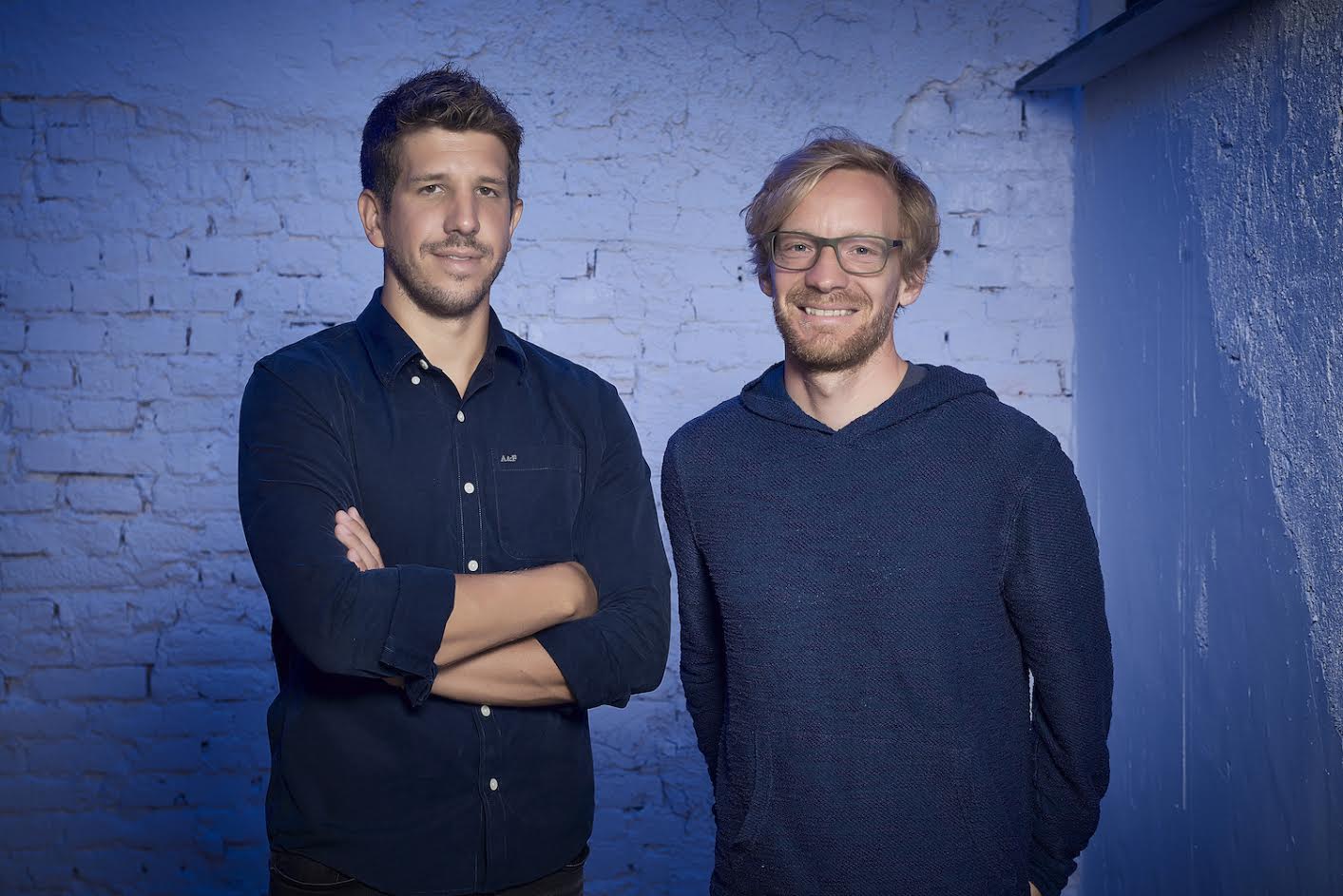
(Luka Abrus with partner Viktor Marohnic, right)
2. How would you compare the perception of an entrepreneur in Croatia to one in Germany or the USA, for example?
Well, I live in a bubble. I'm surrounded by positive stories, globally successful people, fellow entrepreneurs, self-employed consultants, and in general people who understand what creating value means. Over the past 10 years of my entrepreneurial career I've seen a shift towards a more positive attitude to entrepreneurs. And especially in the light of the emmigration happening in the last few years, people are now paying more attention to individuals and companies creating value out of nothing and who are keeping people well-paid, professionally growing, and ultimately happy in Croatia.
What I think we still miss is more understanding and support for failures. I've seen a few examples of companies experiencing a downturn, and people still don't realize it's all part of the circle of life, and actually an extraordinary experience to learn from.
3. Tell us about your entrepreneurial experience so far in Croatia - the highlights, the lows, the successes and the failures.
To be frank, my experience as an entrepreneur in Croatia has been perfect. But the main reason is that I really pay no attention to the bureaucracy, formalities, paperwork or any other imposed burden. I find myself lucky to have great people inside and outside of the company who take care of that, so I can focus on building the business. I'm actually being selfish in a way, as I'm doing only the things I actually love and enjoy.
100% of our business is in the US, we have no clients in Croatia, and that was, obviously, a deliberate move. So we operate more as a US company building our global brand. I still can't understand how there's no bigger strategy and long-term picture with legislators (a good example is the regulation around flat-rate crafts, or "paušalni obrt", which is a really complex topic with many sides and numerous benefits and disadvantages to all parties on whole market). But I choose not to lose sleep over it - it's simply a playground we operate in, and we play by the rules and do our best. Though I wish there were more courageous moves being taken, such as changing (or eliminating?) the income tax, improving (or loosening?) the Labour law, etc.
4. What are your hopes for the conference and why did you decide to accept the invitation to speak?
It's a clear opportunity to learn and get reinvigorated by the energy of other entrepreneurs. For myself, my speech will be the lowlight, as I can't learn from myself :) And I'm really looking forward to hearing other ideas, stories and visions, and just hang out with great folks.
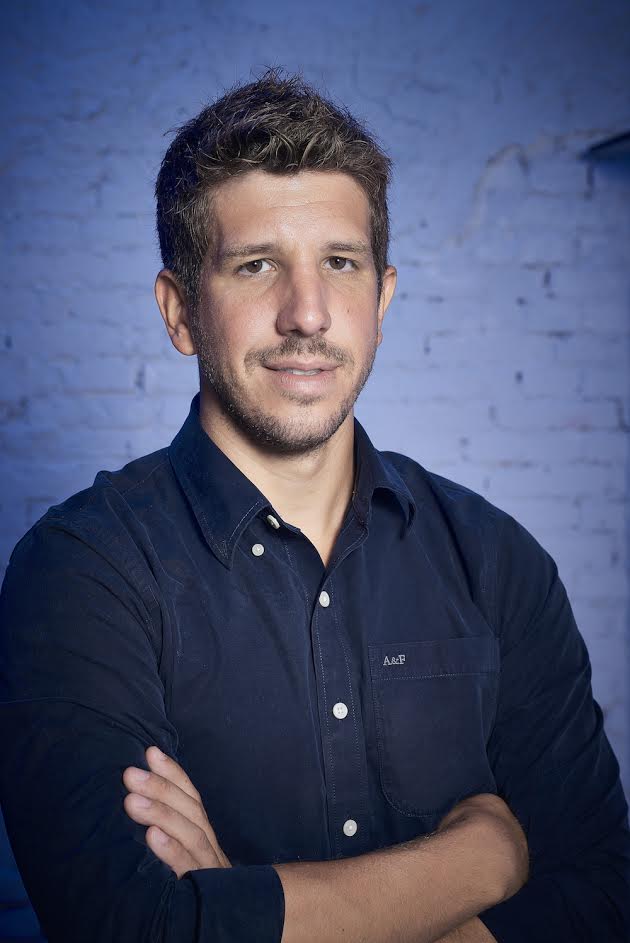
5. Tell us a little about your own entrepreneurial mindset.
I feel confident taking risks, and I understand it's a marathon, and endurance is the key skill. There is a term I recently learned while sailing - art of marginal improvements. And that's exactly it, after you set the right vision and long-term strategy, it's about making sure each day we move one step ahead, no matter how small. Being completely focused, never letting go of the tiller or sails, and fighting for each incremental improvement. And it works, when I look at where we've been 5 or 10 years ago and compare it to now, there has been a handful of visionary strategic decisions, and everything else was just making sure we win our daily battles and move forward.
6. Instilling an entrepreneurial mindset into a society which has grown up with socialism will take some time and effort. What is the roadmap to achieve this?
I believe it's two things - first is giving more spotlight to successful entrepreneurs, and indirectly showing that there are people who became successful on the market just with their skills and knowledge. We simply need more success stories, from people who have no political background. We already have a few, and I'm very excited to see them grow even further, and change our landscape before our eyes - Infobip, Nanobit, Rimac.
And the other is changing the system, on both the educational front but also the judiciary. This transition will take much longer, and the system is too stiff and not keen to change. But, small steps, marginal improvements, let's take our battles one by one, as I lost hope for a visionary revolution.
7. What advice would you have for someone in Croatia thinking about taking the entrepreneurial route?
Do it now, and focus solely on exporting your services, products, knowledge. Travel, and feel confident with failing, because everyone else is probably expecting you to. Think big and find the right role models to look up to.
8. Andrija Colak once told me that the best thing about doing business in Croatia is that if you can succeed here, you can succeed anywhere in the world. Do you agree, and why is it so hard to do business in Croatia?
Well, I've heard stories, but again, doing IT is a bit different than all other verticals. We invest in people capital, and do not need large upfront investments, do not deal with a lot of bureaucracy or real estate. I'd say every business is hard and challenging, but that's where the reward lies.
9. Three things you would like to see to help entrepreneurs in Croatia.
a - More Infobips, Nanobits and Rimacs (and Fives!) to lead the way.
b - Visionary government ready to make changes over a decade, resistant to populism.
c - More events like this, where entrepreneurs are ready and willing to share their knowledge, understanding we're not competitors, but tiny grains of sand on the global market.
I'd settle with 2 out of 3 for now, obviously. :)
More info on the conference can be found at www.poduzetnickimindset.biz and FB Casopis poduzetnik.
Entrepreneurial Mindset: Meet the Speakers - Berislav Horvat
September 9, 2019 - Continuing our look at the speakers for this week's inaugural Entrepreneurial Mindset conference in Zagreb on September 12. Next up, EY supremo, Berislav Horvat.
It quickly sold out and there is a waiting list of hundreds should tickets become available. Next week's Entrepreneurial Mindset conference in Zagreb is the first of its kind in Croatia, and it includes a top draw list of speakers, several of the most successful entrepreneurs in the country. TCN will be covering the event and we continue our series interviewing some of the key speakers. Our latest guest is co-organiser and EY boss, Berislav Horvat.
Berislav Horvat, Country Managing Partner in EY Croatia and experienced business leader, focused on building a better working world in Croatia. Responsible for launching the EY Entrepreneur Of The Year program in Croatia, the only worldwide entrepreneurial business award held across more than 60 countries.
1. As a Brit, I notice that entrepreneurs are not embraced and supported as much in Croatia as they are in countries with a longer capitalist tradition. How does it feel working in the entrepreneurial world here, and how did you decide to embark on this road less travelled?
Entrepreneurs in Croatia still don’t have the status in the society they deserve and are often looked upon with skepticism. But things are slowly turning around. Initiatives such as the upcoming Entrepreneurial mindset conference and the EY Entrepreneur Of The Year program which we launched five years ago, promote entrepreneurship and contribute to a positive change in perception. We witness success stories of our entrepreneurs all the time, and I notice firsthand that things in Croatia are not so negative. The focus of the public is changing, but it might not be as fast as we would like it to be.
2. How would you compare the perception of an entrepreneur in Croatia to one in Germany or the USA, for example?
Unfortunately, we are well behind developed countries such as Germany and USA, but also behind other countries that are still in transition. Countries that have a long tradition of entrepreneurship have a different perception of success which often comes after a few failures. The idea of failure and the fear of ‘what will neighbors say’ is still something Croatians are burdened with. There is a huge cultural difference between Croatia and developed countries where entrepreneurship and the entrepreneurial way of thinking are taught from an early age. I believe it’s important for young entrepreneurs to understand that every attempt is a success, and that a failure is not the end of the entrepreneurial path, but an experience that will contribute to future business success.
3. A conference on the entrepreneurial mindset is very innovative for this part of the world. How did it come about?
It’s true that there aren’t many events dedicated solely to entrepreneurship and to entrepreneurial topics. It rarely happens that so many successful entrepreneurs come together with a simple goal to share ideas and experiences and to motivate others. We joined efforts with the organizer, ‘Poduzetnik' magazine and Ognjen Bagatin who shares EY’s views and enthusiasm, and created a conference with a focus on an entrepreneurial mindset as the key driver of business success and economic growth. In addition, the conference is a great complement to our EY Entrepreneur Of The Year program and provides us with the opportunity to continue to raise awareness about the importance of entrepreneurship.
4. What are your hopes for the conference and what do you hope to achieve?
We hope to encourage cooperation among entrepreneurs, provide a platform for sharing experiences and ideas, and the opportunity to work together and join efforts towards expanding businesses and winning large and complex jobs.
5. I assume that this is not just a one-off conference, but part of a longer-term strategy. Can you tell us a little more?
We believe that the conference will be a great success and grow to become a significant forum of entrepreneurs and an important business conference dealing with entrepreneurial topics.
6. As conference program partner, I must congratulate you on such a great list of speakers, the real cream of Croatia's entrepreneurial class. Was it easy to persuade them?
Entrepreneurs recognize that this initiative is worth contributing to. They are all aware that promoting success, bringing entrepreneurship closer to young people and focusing more on the positive is essential for Croatia’s future.
7. Instilling an entrepreneurial mindset into a society which has grown up with socialism will take some time and effort. What is the roadmap to achieve this?
Society plays a key role in fostering entrepreneurial mindset, innovation and creativity from an early age. Education reform with its change of the old-fashioned approach towards learning, as well as creating a positive perception about entrepreneurship and developing financial literacy are all elements that can contribute to developing entrepreneurial culture and to a new generation of successful entrepreneurs. This requires joint efforts from all stakeholders – entrepreneurs and business community, government representatives, media and the general public – as we need to work together to make Croatia a place where entrepreneurship is truly supported and where the entrepreneurial spirit and mindset are nurtured from an early age.
8. Andrija Colak once told me that the best thing about doing business in Croatia is that if you can succeed here, you can succeed anywhere in the world. Do you agree, and why is it so hard to do business in Croatia?
I believe entrepreneurs encounter barriers and difficulties anywhere in the world. Here it might be a bit more complicated because entrepreneurship in Croatia and Croatia as a country are still young and there are quite a lot of challenges entrepreneurs come across when starting a business. We recently conducted a survey among candidates from five editions of the EY Entrepreneur Of The Year program and the results show that the biggest challenge facing Croatian entrepreneurs in the initial business phase is the market expansion challenge, followed by the challenge of finding and hiring good quality employees, raising funds and establishing the organizational structure within the company. Surprisingly, slow and overcomplicated administrative procedures that often cause a headache for entrepreneurs are listed as the sixth challenge. Lately, Croatia has been facing a workforce shortage, especially due to the increasing emigration to other EU countries. Results show that 85 percent of entrepreneurs find this to be the greatest challenge for the development of their business in the future. This is followed by high taxes and frequent tax legislation changes, which is considered to be a significant challenge by 54 percent of entrepreneurs.
9. How do you see the entrepreneurial scene in Croatia, and what changes have you noticed in the last five years?
The entrepreneurial scene in Croatia has changed quite a bit in the past five years. In the past, there was hardly any talk about startups, funding and similar entrepreneurial topics. Today the situation is different: the entrepreneurial scene has come to life. Who started which business, who invested how much, which entrepreneurial incubators are active and similar topics are often discussed. We believe the EY Entrepreneur Of The Year program also contributed to this change of focus and we salute all future initiatives promoting success.
10. Three things you would like to see to help entrepreneurs in Croatia.
Firstly, the predictability of the business environment. Secondly, the judiciary that ensures business security and promptness of resolving any possible issues. And thirdly, further tax reductions, especially on income, to ensure competitiveness and workforce retention. I believe that there is a consensus that structural reforms need to be carried out, and we only need a stronger political will to drive them. Big changes are difficult to carry out in a short time, but it's important to get things started because even the smallest change can lead to great results.
More info on the conference can be found at www.poduzetnickimindset.biz and FB Casopis poduzetnik.
To learn more about Berislav Horvat and EY services in Croatia, check out the official website.
Entrepreneurial Mindset: Meet the Speakers - Fran Mikulicic
September 8, 2019 - Continuing our look at the speakers for next week's inaugural Entrepreneurial Mindset conference in Zagreb next week Next up, corporate consigliere, Fran Mikulicic.
It quickly sold out and there is a waiting list of hundreds should tickets become available. Next week's Entrepreneurial Mindset conference in Zagreb is the first of its kind in Croatia, and it includes a top draw list of speakers, several of the most successful entrepreneurs in the country. TCN will be covering the event and we continue our series interviewing some of the key speakers. Our latest guest is corporate consigliere, Fran Mikulicic.
1. As a Brit, I notice that entrepreneurs are not embraced and supported as much in Croatia as they are in countries with a longer capitalist tradition. How does it feel being an entrepreneur here, and how did you decide to embark on this road less travelled?
Haters gonna hate, and dumbasses will behave like their name suggests. Father, forgive them, for they know not what they do. It is our job to enlighten them. How does it feel? It feels great. Just take your focus from what you can’t change and do put it on what you can. Very liberating and empowering. In my case, the decision just presented itself. When I was a young lad, I worked in a well-known Croatian company. I had my share of poor management, illogical business decision making, bullying and corruption for two lives. Quoth the Raven “Nevermore”. So, when I got back from the U.S. with my MBA degree, I indeed found two roads diverging in front of me. To get a management job in some big company or to take the one less travelled by. And it made all the difference.
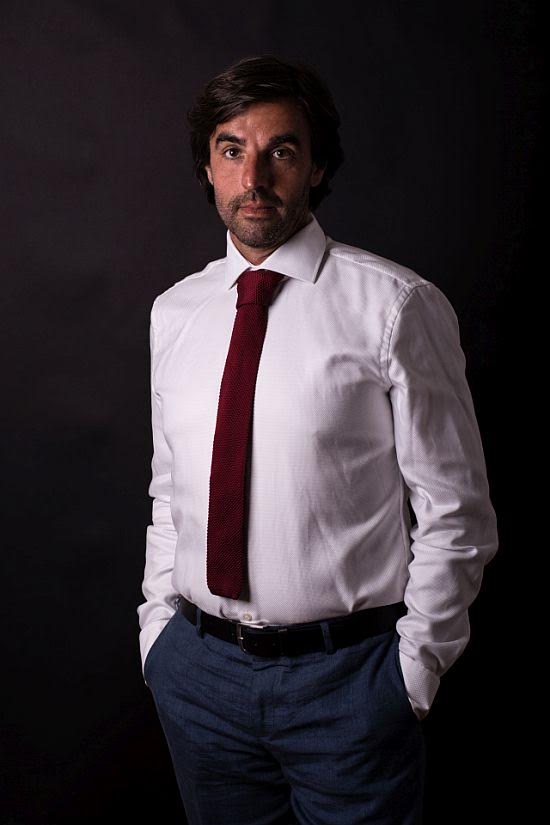
2. How would you compare the perception of an entrepreneur in Croatia to one in Germany or the USA, for example?
I’ll stick with the U.S. For starters, in the U.S. one is innocent until proven guilty. In Croatia, being an entrepreneur can mean just the opposite. Second, would you even emphasize the word entrepreneur in the U.S. or would it be the most normal thing that someone founds his own or her own business? Just the normal approach to make a living. My mom still wonders whether I will get a proper job. Third, the different perspective about the failure of your entrepreneurial endeavor. In the U.S. you fail, take the beating, get up, and start again. Here, the shame can be unbearable. The village will talk. Therefore, it is better not to try than to try and not succeed. What shame, you may ask. Precisely. Lastly, the concept of security, or better to say false security, risk-taking, getting out of your comfort zone and looking over the horizon in understanding what is possible.
3. Tell us about your entrepreneurial experience so far in Croatia - the highlights, the lows, the successes and the failures.
There are no failures, just more lessons to be learned. My successes and highlights are always connected to my clients. When they succeed, I did my thing.
4. What are your hopes for the conference and why did you decide to accept the invitation to speak?
The conference will be great by itself. All my hopes are directed to what will and may be happening after the conference. Decided to accept to speak?! A good one. I am honored to be a part of this conference and thankful that the organizers offered me this opportunity. The name of the conference is actually the name of my column in Poduzetnik magazine for last year and a half. That makes me something like a godfather, doesn’t it?! Haha.
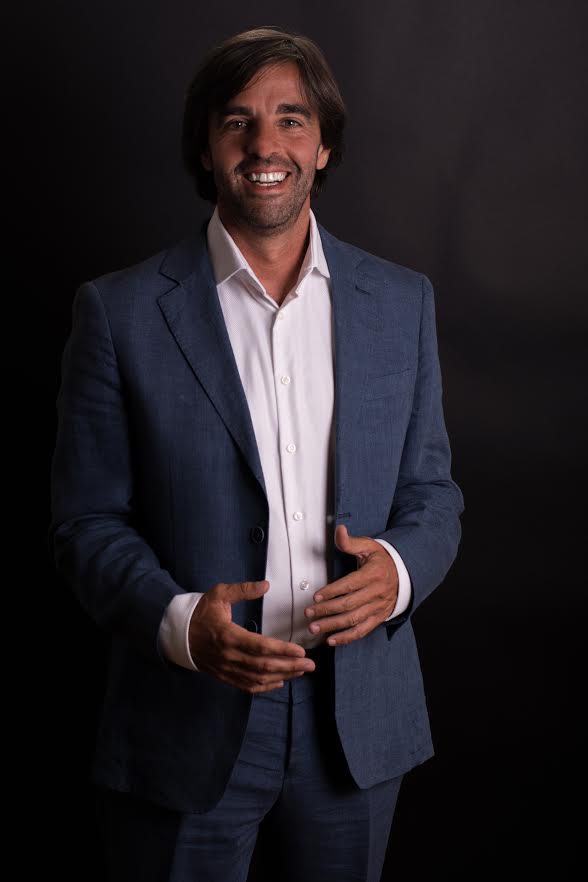
5. Tell us a little about your own entrepreneurial mindset.
A little eccentric, I must admit. It is a constant inner struggle between being a business-oriented CEO and learning determined R&D master. For the better or for the worse, it has always been the learning opportunity that drives me. I’ve made at least dozens of financially unsound decisions just to be able to work on challenging projects or with clients who ‘couldn’t be helped’. And don’t even get me started with my voluntary work with young people. As a CEO I should take a stick and give myself a good spanking. But as a mentor, I feel blessed and grateful. The only growth I am really interested in would be the growth in the mindsets of my client. As an entrepreneur, I live with all the consequences of my decisions and action. And at the end of the day, to be able to support people in the improvement of their business and lives is a reward by itself.
6. Instilling an entrepreneurial mindset into a society which has grown up with socialism will take some time and effort. What is the roadmap to achieve this?
I can’t believe these questions. You actually said “some time and effort”?! My dear Brit friend, it will take a lifetime of time and effort and even that does not guarantee the success. Regarding the roadmap, I would bet that it was the same question Hannibal was asked by his men before crossing the Alps. ‘The path, we will either find or create.’ But, what we can’t do will not stop us from doing what we can. And we will continue to give lectures, organize conferences, write articles, support entrepreneurs and mentor students and young people. If we share our vision with enough entrepreneurs and are able to persuade them to start doing some of the things we are doing, then we would be one step closer to the finish line. Entrepreneurship can’t be taught in the classroom. Some management knowledge and skills can be presented and explained. But that’s about it. Imagine experienced and successful entrepreneurs holding mastermind groups in different parts of Croatia influencing future entrepreneurs and helping them get started, staying motivated, and learning the ropes.
7. What advice would you have for someone in Croatia thinking about taking the entrepreneurial route?
OK, I would need a whole book for this. To oversimplify it, whatever people do they do it either out of love or out of need. Both reasons are good for the entrepreneurial route. Some sound advice would go as follows. First, what is your true objection? To make money, to gain freedom, to follow your passion? Be clear about it because there will be trade-offs. Second, you will have your doubts, fears, and insecurities. That’s normal. It would be more alarming if you would not have them. Just set them aside and go to the next point. Third, work more. You will burn the midnight oil and you will see the dawns. People around you will be having coffee and complaining about everything and you will be working. The good thing is that if it is something that you like, you will love every minute of it. Fourth, work smarter. The more you learn, the more you know. The more you know, the more you understand how little you know. Fifth, surround yourself with likeminded people. People who have been through what you will go through. People who will provide you with the right type of support when you will need it.
8. Andrija Colak once told me that the best thing about doing business in Croatia is that if you can succeed here, you can succeed anywhere in the world. Do you agree, and why is it so hard to do business in Croatia?
Haha. This is a very insightful observation. Mostly true. But there are two potential trade-offs here. First, you develop the skills essential to your survival in this Kafkian novel that are totally unnecessary in normal countries. And their entrepreneurs, in the mean time, developed some more meaningful skills that you will have to learn twice as fast. Of course, you maybe want to do business in some other third world country and, in that case, you will be suitably prepared. Second, success here does not prepare most of us to dream big enough and to have that certainty that you can conquer the world. Is it hard? Well, it is not too hard. Yes, small market and low disposable income. Yes, red tape, taxes, and legal complexity. Yes, 90% of the country can’t even grasp the concept of creating and adding value. Hm, maybe you are right. How did JFK put it? We choose to, not because it is easy, but because it is hard?”
9. Three things you would like to see to help entrepreneurs in Croatia.
First, I would love to see financial responsibility from the political caste. So far, so many of them are like a little boy who asks his mother to give him some money. “I don’t have any. We spend it all.”, she replies. “There is an ATM over there. Go and get some”. However, I don’t see this happening any time soon. Like a story about a frog and a scorpion. Second, I would love to see law obeying behavior of the political caste. Have you, Paul, ever seen the inconsistencies in the analysis of the number of citizens over 18 and the number of voters in Croatian towns? More voters than citizens. So, math is also relative, after all. No, I don’t see this happening either. But, if I did I would then like to see the joint, laser-focused, effort of the entrepreneurs and all budget beneficiaries in making Croatia technologically advanced, easy to do business in, fantastic to live here, and full of globally competitive companies. The weirdest part is that it should be the most normal thing. But it isn’t.
More info on the conference can be found at www.poduzetnickimindset.biz and FB Casopis poduzetnik.
To learn more about Fran Mikulicic's services, check out his official website.
Entrepreneurial Mindset: Meet the Speakers - Jadranka Boban Pejic
September 8, 2019 - Continuing our look at the speakers for next week's inaugural Entrepreneurial Mindset conference in Zagreb next week Next up, Biovega CEO, Jadranka Boban Pejic.
It quickly sold out and there is a waiting list of hundreds should tickets become available. Next week's Entrepreneurial Mindset conference in Zagreb is the first of its kind in Croatia, and it includes a top draw list of speakers, several of the most successful entrepreneurs in the country. TCN will be covering the event and we continue our series interviewing some of the key speakers. Our latest guest is Jadranka Boban Pejic, CEO of Biovega.
1. As a Brit, I notice that entrepreneurs are not embraced and supported as much in Croatia as they are in countries with a longer capitalist tradition. How does it feel being an entrepreneur here, and how did you decide to embark on this road less travelled?
Lack of support is a challenge but through the years of experience we have learned how to lean on each other (partners) and how to be flexible and how to adjust to constant changes in structure, laws etc. A strong desire to have a positive impact and to make a difference was the main driving factor when we started our organic food company.
2. How would you compare the perception of an entrepreneur in Croatia to one in Germany or the USA, for example?
We have to learn to accept business and life here as a process and to look into the future with more patience and positive approach.
3. Tell us about your entrepreneurial experience so far in Croatia - the highlights, the lows, the successes and the failures.
It is not easy to put almost 30 years of experience into one or two sentences but I learned a lot through all my experiences. The fact that we are existing on the market is a success in itself and that we have a lot of loyal customers and a fantastic team of employees is a highlight. All so-called failures are part of the education and evolution along the way, and no one can avoid them. Of course, there is a lot of frustration coming from slow and ineffective administration, as well as pressure from high taxes.
4. What are your hopes for the conference and why did you decide to accept the invitation to speak?
My personal mission is to inspire others so if I can inspire someone with my experience and energy that would be great. Some of the participants have been a huge inspiration to me too.
5. Tell us a little about your own entrepreneurial mindset.
I like to think that we are here with a purpose and that our responsibility is to work with integrity, commitment and empathy so that we can improve the quality of life of everyone included in our business adventure.
6. Instilling an entrepreneurial mindset into a society which has grown up with socialism will take some time and effort. What is the roadmap to achieve this?
Education from an early age.
7. What advice would you have for someone in Croatia thinking about taking the entrepreneurial route?
Believe in yourself because that is the most important thing that you have.
8. Andrija Colak once told me that the best thing about doing business in Croatia is that if you can succeed here, you can succeed anywhere in the world. Do you agree, and why is it so hard to do business in Croatia?
Yes, I do agree. The perception of business and business people is very negative and there are not enough efforts to change that perception from the ruling structures.
9. How do you see the entrepreneurial scene in Croatia, and what changes have you noticed in the last ten years?
Lots of new young, brave, smart and creative people are taking the lead in some industries and that is a huge hope for the future.
10. Three things you would like to see to help entrepreneurs in Croatia.
a) As we are here to serve society so is the government structure should be to serve us.
b) Education has to be adjusted to modern times and needs.
c) Transparency in institutions and less bureaucracy.
More info on the conference can be found at www.poduzetnickimindset.biz and FB Casopis poduzetnik.
For more information about the healthy world of Biovega, visit the official Biovega website.
Entrepreneurial Mindset: Meet the Speakers - Ognjen Bagatin
September 7, 2019 - Continuing our look at the speakers for next week's inaugural Entrepreneurial Mindset conference in Zagreb next week Next up, conference organiser and entrepreneurial driving force, Ognjen Bagatin.
It quickly sold out and there is a waiting list of hundreds should tickets become available. Next week's Entrepreneurial Mindset conference in Zagreb is the first of its kind in Croatia, and it includes a top draw list of speakers, several of the most successful entrepreneurs in the country.
One of the co-founders of the conference is Ognjen Bagatin, one of the most energetic proponents of change and positivity in Croatia today. In addition to running the award-winning and rapidly-expanding Bagatin Clinic in Zagreb and Split, Bagatin is at the heart of efforts to establish Croatia as a top medical tourism destination on the global map, as well as to strengthen ties between the business community in the diaspora and the homeland. His magazine, Casopis Poduzetnik is rapidly becoming a focal point for the business community in Croatia. TCN caught up with Bagatin to learn more about the conference on September 12, which will also be live-streamed.
1. As a Brit, I notice that entrepreneurs are not embraced and supported as much in Croatia as they are in countries with a longer capitalist tradition. How does it feel being an entrepreneur here?
You are right in the sense of support, but that just means there are huge opportunities for entrepreneurship in Croatia. At the moment the biggest issue is our mindset, there is a lack of an entrepreneurial mindset and understanding among the general public. If there are more successful entrepreneurs there will be more chances for everybody, but like I said it is an opportunity.
2. How would you compare the perception of an entrepreneur in Croatia to one in Germany or the USA, for example?
The perception of an entrepreneur in the USA and Germany is much better and more motivating to get into new business opportunities. There they see failures as an opportunity and a bump on the road to success. In those countries, the entrepreneur is considered to be a driving force of the economy, which they really are.
In Croatia, we still have a long way to go to get a perception like that, and that is the reason why we need to put focus on the thousands and thousands of successful entrepreneurs who are doing an amazing job to create an environment where you can succeed, as opposed to the current "you can`t succeed" environment. Entrepreneurs are those who create jobs, create value for the economy and a better environment for new entrepreneurs.
3. A conference on the entrepreneurial mindset is very innovative for this part of the world. How did it come about?
Our goal was to create an environment of success and creativity, and to give hope to all those who are thinking of leaving the country. We are doing the conference so that both new and more experienced entrepreneurs get inspiration from those who are doing an amazing job and from whom we can learn. Our goal is to celebrate others' success, to focus on future growth and to learn from the best of us. We want Croatia to be the most creative, the most innovative and most entrepreneurial country in the new Europe.
4. What are your hopes for the conference and what do you hope to achieve?
Our goal is to inspire entrepreneurs and intrapreneurs and encourage them to continue with their efforts to succeed in Croatia. That is why we choose EY Croatia to be program partners and together with them we gathered entrepreneurs from their project EY Entrepreneur of the Year which has been running for 5 years in Croatia. We are very grateful to have them at our conference as speakers, but also as attendees. We hope to show that the entrepreneurial community is focused on the future, and that we celebrate each other's success. The next goal for us is to do these kinds of event but focused on students, because they are our greatest strength.
5. I assume that this is not just a one-off conference, but part of a longer-term strategy. Can you tell us a little more?
You are right, this is the start of a long term platform for the promotion of entrepreneurship, and we have plans to organize this every year and to have a smaller conferences for promotion of entrepreneurial mindset and entrepreneurship with university students and high school students, but also to have a series of podcast, articles and videos on this topic through www.poduzetnik.biz and our Entrepreneur Magazine. Our goal is to create a new army of entrepreneurs who we all are going to be proud of.
6. As conference organiser, I must congratulate you on such a great list of speakers, the real cream of Croatia's entrepreneurial class. Was it easy to persuade them?
The great thing is that we all have similar goals and want to give back to society, so in that sense it was easy, but it is also easier when you have EY Croatia by your side as a Program Partner?
7. Instilling an entrepreneurial mindset into a society which has grown up with socialism will take some time and effort. What is the roadmap to achieve this?
It will take some effort to install an entrepreneurial mindset, but with the strengthening of entrepreneurial community and successful entrepreneurial role models such as Mate Rimac (Rimac Automobili), Silvije Kutic (Infobip), Nenad Bakic (Varteks and Croatian Makers) , Alan Sumina (Nanobit), Ivan Mrvos (Include), Matia Zulj (Agrivi), Aleksandra Dojcinovic (Lei lou) and many, many others, and the new generation will embrace this opportunity and find the way to succeed, and the more of them who succeed will make it easier for everybody else. That is why the culture of success is our greatest chance.
The road map is simple, feed the public with positive news from the business sector, and do it more often than with negative news. We have so many of successful Croatians in Croatia and abroad, and we need to share more of their success to the others, it is our responsibility if we want our children to grow up in a healthier environment and to make Croatia a great place to live and work. I think that is something we all want.
More info at www.poduzetnickimindset.biz and FB Casopis poduzetnik
Entrepreneurial Mindset: Meet the Speakers - Kristina Ercegovic
September 4, 2019 - A star-studded lineup of Croatian entrepreneurial excellence will assemble in Zagreb on September 12 for the first Entrepreneurial Mindset conference. TCN has kicked off a new series meeting the speakers of the conference. First up, meet Kristina Ercegovic - an entrepreneur, writer, and professor of entrepreneurship.
1. As a Brit, I notice that entrepreneurs are not embraced and supported as much in Croatia as they are in countries with a longer capitalist tradition. How does it feel being an entrepreneur here, and how did you decide to embark on this road less travelled?
Do what I do, and that is surround yourself with entrepreneurs who think like you and support you, and just act and follow your vision, purpose and path. It feels great.
I started my first business at the age of 26 out of passion, for which I quit my well-paying job at the largest pharma company. It was the best decision of my life. Being your boss is priceless. Since then I started two more companies and many projects, sold two out of three companies, am writing my 6th book now and teaching entrepreneurship at two universities. I am trying to do my part in making Croatia a great place to live and do business in and help everyone I meet on my way.
2. How would you compare the perception of an entrepreneur in Croatia to one in Germany or the USA, for example?
When I ask my students, they still think entrepreneurs are thieves and they name one guy as an example.
We need to clearly communicate that more than 90% of all businesses are micro and small and that they are the basis of economy and society. We also need to send a message that these people are heroes. Paying yourself a salary and hiring one or ten more people that is an example to follow, that is a healthy role model, that is someone we should admire. We need to redefine our values as a society.
3. Tell us about your entrepreneurial experience so far in Croatia - the highlights, the lows, the successes, and the failures.
Highlights – establishing the first mystery shopping agency in the Balkans, selling it after 10 years, writing 5 books, 2 being bestsellers, establishing and running Business cafe events for 9 years and in 7 countries using franchise, receiving many rewards and recognitions, but the biggest one being a great number of people starting and succeeding in business because of everything I do. Blogs, books, events... My biggest success is my sense of inner fulfillment.
I failed in everything you can imagine – choosing the wrong people for franchising, several times, failing to manage my money efficiently, trusting people too much, undercharging, starting to do something without a written agreement, giving too much to clients, failing to lead employees properly, burning out, letting personal relationships and friendships fall apart. You name it I experienced it. But I live my life according to my rules, no regrets. Would do it all over again. It was a fun ride until now, and I am sure it will only get better.
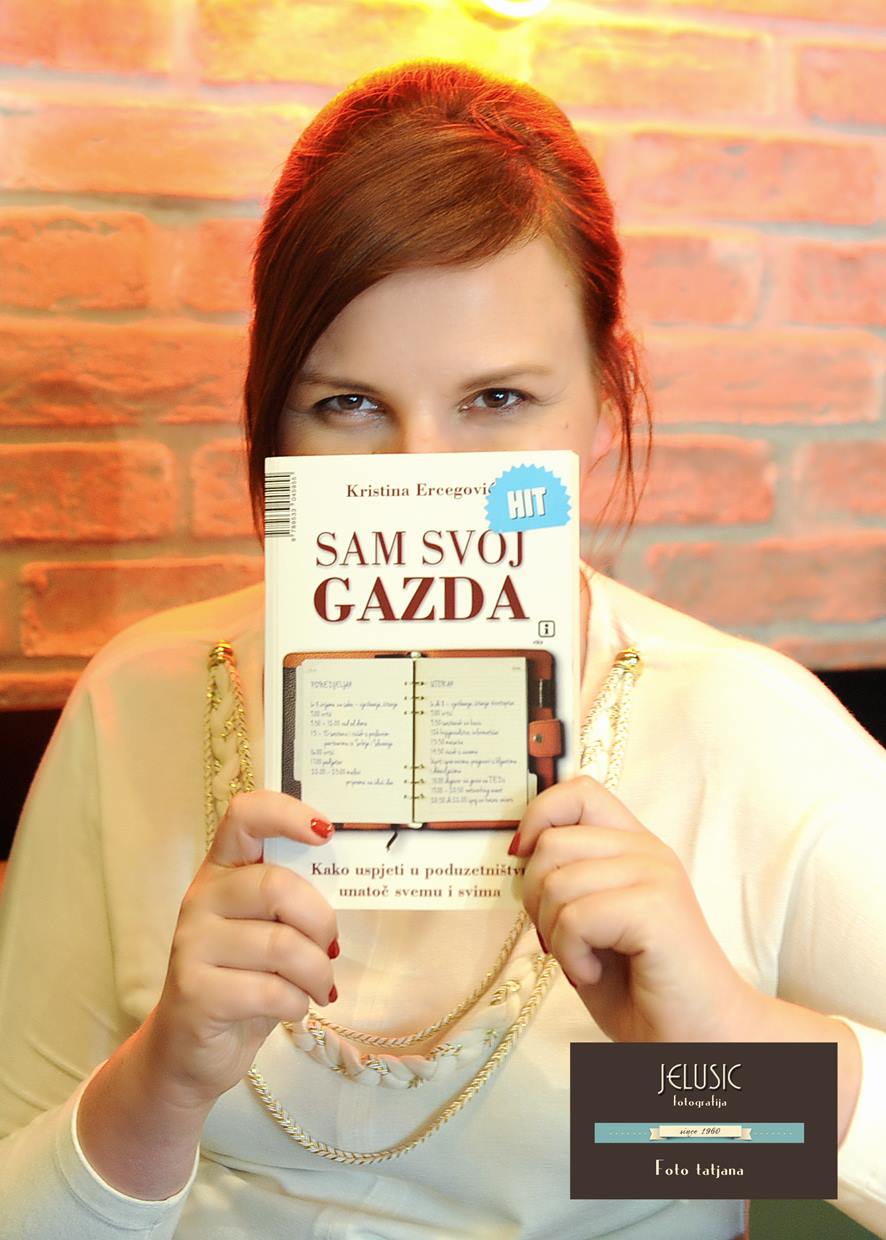
4. What are your hopes for the conference and why did you decide to accept the invitation to speak?
Just being among “your people” - 300 people with same energy goals and intentions, just to be a part of that magic – I am so grateful for the opportunity - and you don’t miss this. This is the best part of Croatia, in the same room at the same time.
I am happy to moderate the panel titled 'there is no success without failure'. I intend to show we all go through the same challenges, and it is about what we learn from our mistakes and how quickly we recover from failures and continue.
5. Tell us a little about your own entrepreneurial mindset.
When I encounter a problem, I am focused on finding a solution for the good of everyone involved. I don’t take anything personally. I know mistakes are inevitable and just a learning experience. I know running a business is a tool for our growth and it is always about us, what can we learn and how can we grow. I know we never have enough resources, money, time, people - it is just a matter of doing the best you can with those you have. I am very resilient – I take little time to recover and just stand up after falling down and continue to go. And most important I know everything happens for a reason FOR us and not TO us. And I know the most important thing is to BE then DO then HAVE is a result. It is who we are and not what we achieve – it is about the journey, not the destination.
6. Instilling an entrepreneurial mindset into a society which has grown up with socialism will take some time and effort. What is the roadmap to achieve this?
I am doing my part by regularly writing blogs, books, holding Business cafe events and teaching entrepreneurship at two universities.
We need to show and talk about good examples and entrepreneurial stories in the media because people need role models they can identify with. If they don’t see something is possible, they will not want it themselves.
We need to have events like this and lead by example. Teach our kids from kindergarten that entrepreneurship is also an option, not online firefighters and police officers. It will take time. But I am optimistic.
7. What advice would you have for someone in Croatia thinking about taking the entrepreneurial route?
Stop thinking, start doing. No excuses. Just go ahead and do it.
8. Andrija Colak once told me that the best thing about doing business in Croatia is that if you can succeed here, you can succeed anywhere in the world. Do you agree, and why is it so hard to do business in Croatia?
Definitely. I sometimes joke that half of the world’s most successful companies would fail if it started here.
Lack of capital, high taxes not properly used, laws not being stable and always changing, taxes are also always changing and getting complicated, injustice, nepotism, lack of entrepreneurial mindset, not wanting to take a risk fear of failure, undervaluing ourselves, etc. But in one sentence we need a brave leader – we all know what needs to be done – we need just one person in a key position to actually do it and that is to cut the number of uhljebs drastically and lead Croatia to a better future we all want and deserve.
9. How do you see the entrepreneurial scene in Croatia, and what changes have you noticed in the last ten years?
Since I started 17 years ago, there are many events now, many incentives, everything is more available now, information, capital, people to support you, it is no longer strange to start your own business. It is getting better in all directions.
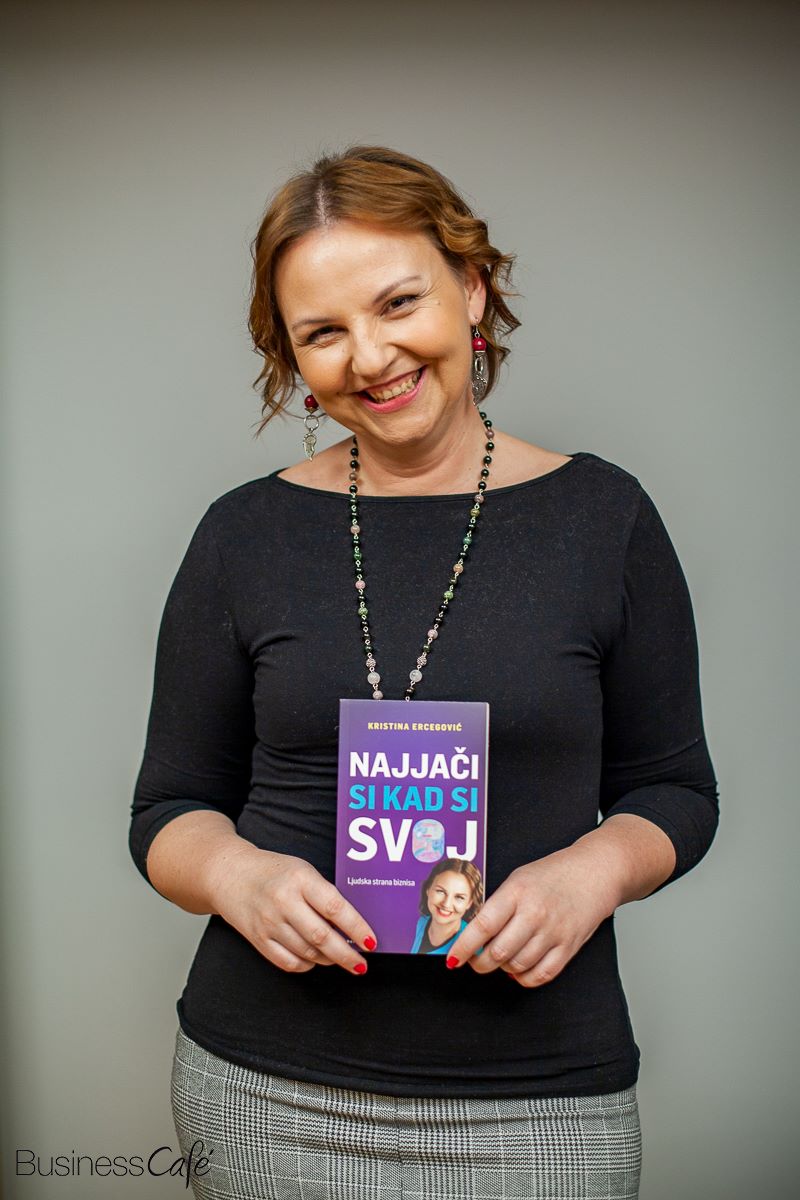
10. Three things you would like to see to help entrepreneurs in Croatia.
• Drastically simplify procedures
• Stable, clear, and fair tax system
• Courts actually solving cases and doing it quickly
You can learn more about the conference and how to attend via the Casopis Poduzetnik Facebook page.
To read more about business in Croatia, follow TCN's dedicated page.
Croatia's Leading Entrepreneurs to Gather at Entrepreneurial Mindset Conference in Zagreb
August 31, 2019 - A star-studded lineup of Croatian entrepreneurial excellence will assemble in Zagreb on September 12 for a stimulating one-day conference on the entrepreneurial mindset.
About 18 months ago, I received a phone call from Nenad Bakic, one of Croatia's most successful and high-profile entrepreneurs. Along with Mate Rimac, Bakic was named recently in the Financial Times' list of top 100 digital champions of Europe. Shortly before he called me, Bakic had taken over the ailing Varteks company in Varazdin, and he was in town to turn things around (and you can read more about the Nenad Bakic Varteks revolution in a recent TCN feature).
Our meeting was very friendly on a number of topics, and then he reached out for his phone and said:
"I want you to see something that you will enjoy, a totally different picture of Croatia." One phone call later and my place was reserved - I was to be a guest at the EY Entrepreneur of the Year award in Zagreb.
It was an outstanding evening of positivity, where Croatia's emerging entrepreneurial class celebrated the very best of their own, with Mate Rimac taking the first prize. It was a real privilege to be a foreign fly on the wall that evening, and it showed me that there was hope for Croatia, as well as a stimulating group of people that I wanted TCN to spend more time investigating. You can read a report on that inspiring evening here.
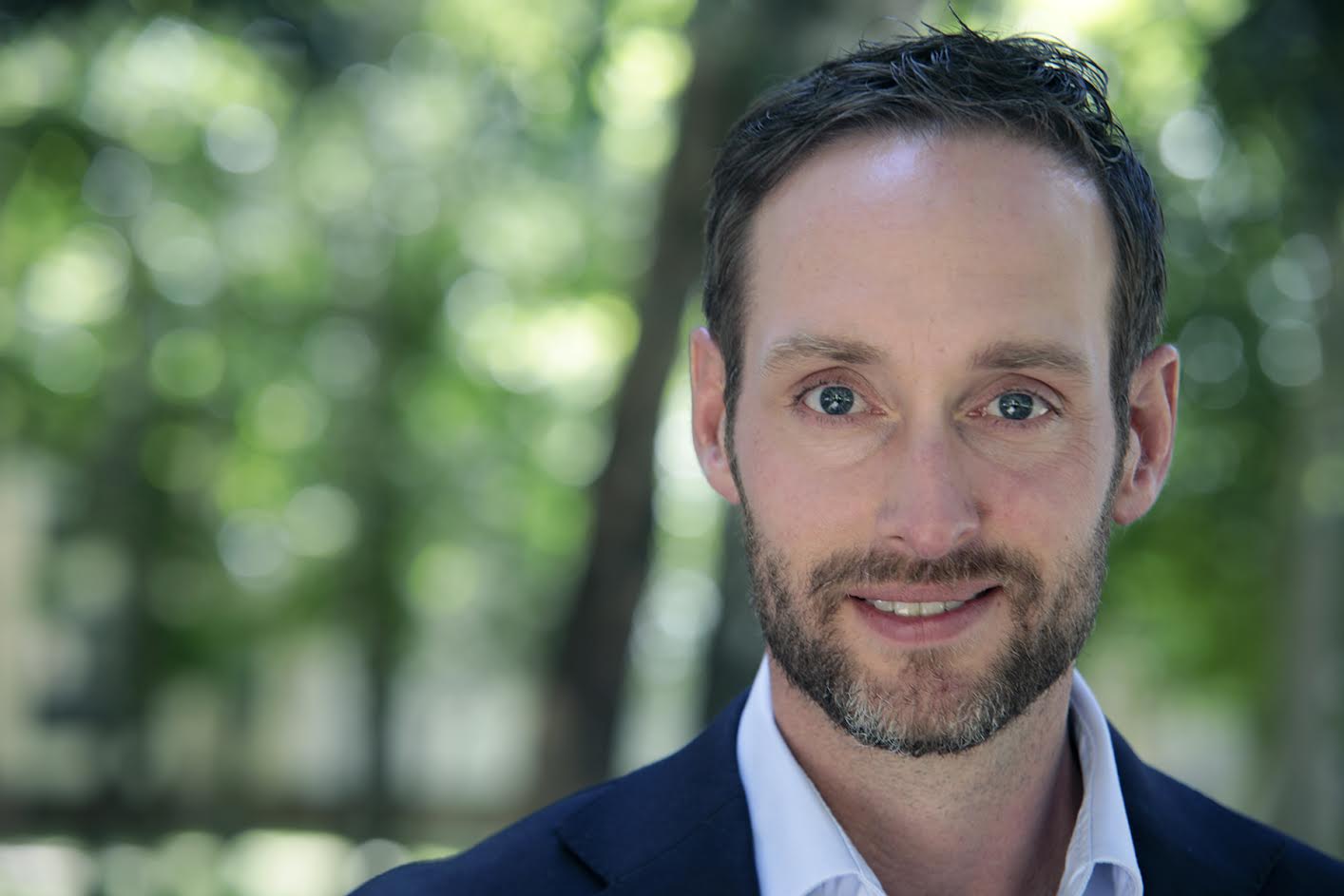
On September 12, that positivity and creativity will take on a new angle, with the first Entrepreneurial Mindset conference taking place in Zagreb. Several of the judges and winners from the EY Entrepreneur of the Year Award will be sharing their knowledge and experiences of being an entrepreneur in a one-day conference in Zagreb. They will talk about their vision, successes, mistakes, courage and mindset. Among the speakers will be two of the more procactive foreign ambassadors on the Zagreb scene: Ambassador Robert Kohorst from the American Embassy and Ilan Mor from the Israeli Embassy.
The event is organised by business magazine Casopis Poduzetnik, in collaboration with EY. The programme is above, the speakers are below. It promises to be a very stimulating event, one which TCN will be attending and covering in detail in the coming days. My understanding is that the conference will be mostly in Croatian (but with translation) with the presentations from the ambassadors in English.
You can learn more about the conference and how to attend via the Casopis Poduzetnik Facebook page.
